#but eurus very much sees himself as the protagonist
Note
That latest chapter of Palmerosa was a big one right in the feels, I'm simultaneously worried that Raphael is going to be a total shit to Astarion and also kind of hoping that he is so that the people at the Last Word can tell him off for it. Cymon is very sweet, but God do I want to punch Eurus in the face.
Aha, I'm sure Raphael will be a total shit and somehow be decent at the same time.
The thing is, I think the people at the Last Word have a very 'how they are in that relationship is between them and none of our business' - so if Raphael were to torment Astarion in order to help ground him, they'd honestly stay out of it.
Eurus definitely showed his most hostile side, but from his perspective, he's got a devil who has locked two folks he knows into contracts, and he's got a vampire spawn who literally can only exist by eating people like him and his partner, who is vulnerable and under his protection.
He has no reason at all to view Astarion from the same lens we do, and he has actually no reason at all to view Astarion as anything other than a violent and unpredictable monster which - frankly - is pretty understandable given this is actually how most vampire spawn tend to behave.
Like, even giving him a chance to talk to Cymon on his own is incredibly generous of him.
We award Astarion personhood and humanity because we've played the game. Eurus however lives in a universe where vampire spawn literally murder, kill and eat people like him so they can keep murdering, killing and eating people like him. They are an infection / parasite / curse / monster that takes over the body of whoever was there before, and uses their visage to hunt. Personhood is not something that is awarded by default to folks like that, especially when those folks are in the company of someone who already has a pretty difficult relationship with The Last Word!
This is one of those situations - that I love writing - where Eurus has his own motives, and is making his own choices. If we view his actions through our own lens of knowing Astarion very well, then he's a dickhead. If we view his actions as someone who is determined to make it clear he isn't afraid to stand up for himself or his loved one in front of two monsters who could - honestly - tear the room and everyone in it apart if they wanted to, he actually becomes someone who's behaving in a fairly heroic way to keep it together for his partner, while still allowing for some flexibility because Alectrona is there.
That whole 'everyone is the hero of their own story' applies very well to Eurus in these circumstances, tbh.
#asks and answers#palmarosa#thespectaclesofthor#like obviously not a *literal* hero#but eurus very much sees himself as the protagonist#and honestly i think anyone would in those circumstances#this is also why imho#eurus shows more humanity to astarion over time#and not less#because he starts to see more and more actual personhood#though he's still extremely concerned that astarion will just#*literally kill his partner and eat him*
33 notes
·
View notes
Text
Chapter 5 – Hey, Soul Sister: Who is Eurus?
Do you get it? She’s his sister? But metaphorically, she’s a part of his soul? I was very impressed with myself for this title. Anyway…
This chapter of the meta is going to deal with the various times we meet Eurus before TFP and what this might mean, which will help us to understand who she is once we have stripped off the disguises.
Before series 4, we had real!characters and MP!characters set up as distinct entities, particularly in TSoT, which distinguishes between MP!Mycroft (the deducing brain) and real!Mycroft, as well as MP!Irene representing desire and real!Irene, who doesn’t come near the episode. The MP section in TSoT, for a lot of people in the fandom, broke down Sherlock’s psyche into MP!John vs. MP!Mycroft – and John is clearly winning.
However, I want to suggest that Sherlock’s psyche isn’t nearly so straightforward as a tug of war between the brain and the heart. Whilst MP!Mycroft undoubtedly represents the oppressively reasonable part of Sherlock’s psyche, that’s not the only thing repressing him – it can’t be. If it were simply a rejection of ‘sentiment’, this wouldn’t be the powerful queer love story we know it to be – there is a lot more internalised homophobia being dealt with than just love being illogical. That’s where Eurus comes in.
Eurus and Mycroft are parallel oppressive forces in Sherlock’s brain, but they’re oppressive in different ways. Having family members and childhood trauma be the psyche’s symbols for repression is particularly poignant in a queer love story, for obvious reasons. However, I want to take you through my reasoning behind Eurus being the most secret and troubled part of Sherlock’s soul.
The first clue is that her prison is called Sherrinford. We all assumed that the third Holmes sibling was going to be Sherrinford back before s4, and it seemed that way in the beginning, with Mycroft mentioning speaking to Sherrinford several times, construing it as a person rather than a place. This is no coincidence – for those who aren’t familiar with the history of the stories, Conan Doyle’s original name for his protagonist was Sherrinford Holmes, which he later changed to Sherlock. That Eurus is trapped inside Sherrinford is a clear suggestion that Eurus is something that’s trapped inside Sherlock – a dangerous MP entity. More important than that, Sherrinford is the version of Holmes that never made it into the books. Plenty of people have worked on queering the Holmes canon and working out what ACD might have been implying and leaving out and arguably none more so in an adaptation that Mofftiss. Let’s think about the implications of this. A kind of second self, not shown to the public, buried inside your mind and forgotten since childhood, which is bursting out into a moment of acute psychological distress. Gee, I don’t know what that could be about. The Sherlock that Sherlock thinks he is has thus far been dominated by MP!Mycroft, but this series is about uniting canon!Holmes with the non-canon, queer Sherrinford who has always existed, judging by the name, and who is currently dominated by the destructive MP!Eurus. The other important point to note here is that Sherrinford is an island in the middle of the sea – that’s not a coincidence, given how much water imagery abounds in this series. I spoke briefly in Chapter 2 X about how water represents Sherlock sinking deeper and deeper into his own subconsciousness – this is the deepest he can go. In Greek mythology, Eurus was the name of the wind most associated with causing storms at sea X – this isn’t a coincidence either. She’s very deliberately tied in with water.
(In real life terms, of course, all this means that a real!Eurus probably does or did exist in some form, although I can’t begin to hazard a guess about this. However, I’m trying to refer to her as MP!Eurus when she’s in her normal form in the MP, in case we get a series 5 with Sian Brooke as real!Eurus, and also to distinguish her from therapist!Eurus etc.)
This is my reasoning as to why MP!Eurus represents Sherlock’s innermost trauma. She is not merely the fact that he loves John – he deduced this in TSoT without her appearance. She is the trauma that he needs to come to terms with. A running theme through our analysis of Eurus will be that her gender is particularly important; her representation of Sherlock’s repression cannot be but as a woman, because for most of s4 he is only able to process his identity through the most heterosexual of lenses. We see this hinted at quite early on in TST, when Sherlock takes on a case called ‘The Duplicate Man’, warning John that it is never twins. The word ‘duplicate’ here, removing twins, leaves us with the only real possibility that it is in fact the same person. Eurus’s gender makes that more difficult to see; she needs to be female, but it’s much more difficult to elide the two characters without employing a Cumberbatch doppelganger. However, this hint that Eurus is not only male but an actual ‘duplicate’ of her brother should give us pause for thought. With this in mind, I want to use the rest of this chapter to analyse her three forms before TFP.
1.) Faith!Eurus

I’m certainly not the first to point out that Faith!Eurus is a mirror for John, nor will I be the last – people jumped on it pretty much as soon as TLD aired. There are a few good reasons for this. Firstly, she walks with a cane, a throwback to ASiP – in case we’d forgotten, however, Sherlock has a flashback to John walking with a cane to make the link explicit. We are supposed to link these two characters, the authors are saying pretty clearly. Faith!Eurus is also suicidal, which John was at the start of ASiP, as made clear by the fact he carried a gun – and Faith!Eurus does the same. Sherlock also takes her out for food (for more on the food/sex metaphor, see here X) which he doesn’t with anyone bar John, and we certainly never see him talk so easily with someone who isn’t John. An eagle-eyed tumblr post that I can’t find now also broke my heart in pointing out that Faith!Eurus’s unseen self-harm matches long-sleeved John Watson a little too well.
This isn’t just the show trying to remind us of what John was like in ASiP, however. MP!Eurus is the trauma prodding Sherlock’s sexuality – it’s going to be hell to get through it, but he absolutely needs to do it. This is Sherlock’s trauma, not reminding him that John was suicidal, but forcing him to acknowledge it in the first place, something which Sherlock has buried. We know this because of the way the image of John forces its way into Sherlock’s mind – it’s much like the way Moriarty breaks into TAB. His brain is making a connection that he’s not quite capable of making and it’s knocking him. His deduction that Faith!Eurus is suicidal is accompanied by that image of John, and he then re-enacts the food ritual he completed with John the evening John left his cane behind, before throwing Faith!Eurus’s gun into the Thames – proving that it was Sherlock himself who stopped John from taking his own life.
This is trauma, however, and Sherlock can’t process it in full – hence why the image of John that breaks in is shaky, and Sherlock tries to push it out of his head. It’s also why Faith!Eurus, who in Sherlock’s subconscious could take any form, specifically takes the form of a woman. His gay trauma means that he first has to process John’s suicidal ideation in a heterosexual dynamic, before fully grasping and applying it to his relationship with John. (Chapter 9 X explains how that plays out over the rest of TLD in full detail.)
2.) E!Eurus

Taking a jump back to surface level plot here, the first thing that grabbed me about E!Eurus was just how minor John’s flirtation with her was. In the terms of a television show which really rides on very high drama (multiple faked deaths and insane cliffhangers for a start), the emotional peak of John’s emotional arc with Mary being that he texted another woman – not went out for lunch, not kissed, not slept with – is bizarre, particularly when we know next to nothing about E!Eurus at this point. It’s incredibly anti-climactic as a means of John falling short of Mary’s view of him. Maybe we can accept it as in line with John Moral-Principles Watson, but it’s difficult to accept as in keeping with the nature of a show whose intent is nearly always to shock.
With this in mind, let’s delve back into the MP to see how that might give this moment greater emotional significance. Chapter 10 X is on the hug scene, and that will deal with John’s revelation of his infidelity in greater detail. For the moment, the most important thing to remember is that John Watson is not real!John – he is heart!John. In other words, we are seeing a similarly heterosexualised re-enactment of Sherlock’s relationship with John.
I will talk a lot in Chapter 10 X about how MP!Mary is linked to Sherlock’s compulsory heterosexuality; at the end of TST, Sherlock substitutes Mary’s body for his because he cannot conceive of John’s queer grief without breaking himself. This is interesting because the E of Eurus actually stands for Elizabeth in this scene (certainly in the credits, and possibly elsewhere, although I can’t remember Sian Brooke actually saying it). Elizabeth is Elizabeth is Mary’s middle name in BBC Sherlock, which looks like another of those shared name links our creators love so well. If so, this begins to justify how Sherlock’s heart is conceiving of its emotions. We will see in TLD that heart!John’s relationship with fem!John in the form of Eurus is aligned with Sherlock’s sexual desire in the form of MP!Irene. Both are hidden and exist only in texts – i.e., they cannot be spoken yet. But they will be.
3.) Therapist!Eurus
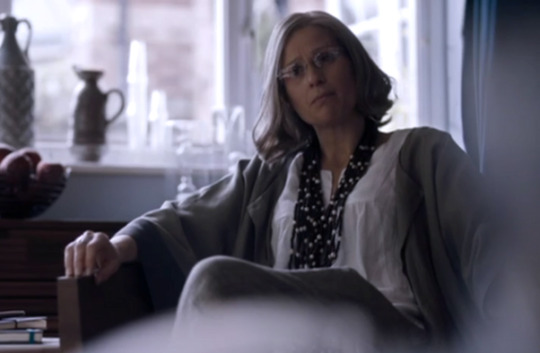
This one is perhaps the most straightforward on a symbolism level, but also possibly the most significant moment in the series. Therapist!Eurus, plain and simple, is Sherlock’s trauma prodding at John, interrogating him like a therapist would, trying to work him out – and largely failing, right? She can get basically nothing about how he feels about Sherlock out of him. But this is part of MP!Eurus’s ongoing project to get Sherlock to wake up – the Gay Trauma is interrogating John, trying to suss him, and failing.
Except, in the final scene of TLD, without the help of Therapist!Eurus, Sherlock has finally sussed John – it has taken until Culverton’s confession to recognise that John is suicidal without Sherlock (Chapter 9 X). The sigh of relief that is the hug scene (Chapter 10 X) is a kind of acknowledgement of that relief that he’s finally worked out what he’s been trying to cover up with drugs – so much so, that he misses the obvious, which is that John is suicidal again. When John leaves his cane with Sherlock in the hospital, it is a reminder of the first time he is suicidal, and Sherlock doesn’t make the immediate leap in his comatose haze that this is what his psyche has been trying to tell him. Hence you have this moment of immense relief and fade out at the end of the hug scene which suggests the end of the episode, and could feasibly end Sherlock’s life, except we’re started awake with a much more abrupt and troubling ending scene – Therapist!Eurus shooting John. Because, of course, if Sherlock is gone again, John must be suicidal again, and it has taken a few scenes of cognitive dissonance for this to clock. Indeed, it’s not Sherlock himself who clocks – Gay Trauma in the form of Eurus!Therapist returns and shoots John for us. This shooting isn’t, of course, permanent (in one of the worst cliffhanger resolutions in TV history), but that’s because it’s not real – it hasn’t happened yet. It is Sherlock, through MP!Eurus, finally recognising the problem – John.
This is particularly poignant in light of the opening and closing shots of TLD. Although there’s the fucky not-blood red that fills the screen at the end of TLD, apart from that the shots of Norbury shooting Mary and Therapist!Eurus shooting John are one and the same shot. It’s also a stylish shot (what I call split screen, but given that I never went to film school I think that’s just my name for it) and it’s repeated enough times over TLD that it’s pretty clear the creatives want it to be memorable. By the time John gets shot, then, we shouldn’t be caught up in the drama of it – we should be thinking, as so many did, “something’s fucky.”
And it is – but it’s brilliantly fucky! Head over to Chapter 7 X if you want to read about Norbury shooting Mary, but TLDR it’s a metaphor for Mary shooting Sherlock as understood from Sherlock’s warped and depressed perspective – and he’s finally realised what it means! The version in which Mary shooting Sherlock means John losing Mary (the Norbury version) is one in which John is sad, goes to therapy, and the world moves on. Now, however, that Sherlock has recognised that John was suicidal, he can also recognise that Mary shooting Sherlock will make John suicidal again – hence why it’s the same shot. Mary shooting Sherlock is the same as John dying – and the latter is much more important in Sherlock’s mind.
[It’s worth noting that the identical shots we see in TST and TLD don’t match the shot in HLV, although admittedly that one’s not in the MP – it does strike me, however, that the sounds are reversed – HLV sounds like a dart, whereas the MP shots sound like bullets. If anyone has any thoughts on that, do let me know – it has me flummoxed for the moment. If you want meta explaining why the shot from TST is the same as HLV, Chapter 7 is here X, and I’m certainly not the first to hypothesise this. For me, the TLD shot being the same is therefore a logical extension.]
#tjlc#chapter five: hey soul sister - who is eurus?#eurus holmes#meta#my meta#mine#bbc sherlock#johnlock#tjlc is real#bbc johnlock#e#mary#queer theory
30 notes
·
View notes
Text
Poisonous connections
While re-reading John’s blog post The Poison Giant, I realised something:
There’s a subtle connection between The Six Napoleons /Thatchers, Mary Morstan and The Sign of the Four/Three, in ACD canon as well as in BBC Sherlock. And the blog’s author might have used a reference to a Rathbone movie to further highlight this connection.
Indeed, ACD seems to reiterate certain events, elements or symbols of his stories throughout his whole Holmes work, just like Mofftiss are doing in BBC Sherlock. In this meta I’ll try to point out some of them, and speculate a bit on their meaning as subtext.

“It all started when i received an email. There was no text just a picture of a pearl. I assumed it was spam, but then, the next day, there was another one. Another email, another picture. Another pearl. And again and again. Six days, six pearls.”
This blog post is written directly after The Empty Hearse, and the case happens after Sherlock’s return, when John is already living with Mary. Apart from the dates and the order of the blogposts, we can deduce this from the fact that Sherlock calls John on his heart phone in the morning to discuss the case, which he wouldn’t need to do if they lived together at the time:

But to me this whole case, with six anonymous pearls, sounds very much taken from canon’s The Sign of the Four (SIGN), where Miss Mary Morstan first was a client who seeked help from Holmes regarding her father’s disappearance.
Miss Morstan: “The same day there arrived through the post a small cardboard box addressed to me, which I found to contain a very large and lustrous pearl. No word of writing was enclosed. Since then every year upon the same date there has always appeared a similar box, containing a similar pearl, without any clue as to the sender.”
Watson goes on to tell us how Miss Morstan “opened a flat box as she spoke and showed me six of the finest pearls that I had ever seen.” So just like in the blog post, there were six pearls in total. But in canon Mary was the one who received the pearls, while in BBC Sherlock it was John, at least that’s what he says.
In BBC Sherlock, when John and Sherlock go to investigate the origin of the pearl e-mails, they find a laptop and a man murdered by a poisoned dart. In TSoT Sherlock very briefly tells the guests on John’s wedding about this case:

The dart-blowing James Swandale from this case is not very unlike the character Tonga in SIGN; a small man who is killing his victims by blowing highly poisonous darts at them.
While re-reading SIGN I encountered some themes that I know are repeated with similar stories later in ACD’s work:
The six valuable pearls that Miss Morstan receives by mail have similarities to the six plaster busts that are smashed in The Six Napoleons (SIXN). One of them contains a hidden, valuable pearl (Pearl of the Borgias). The pearls in SIGN are part of the Agra treasure, which is ultimately lost. In SIXN, however, the pearl is the treasure, and it’s ultimately found.
In SIGN we learn that Miss Morstan’s father was a retired military officer, whose emotion while confronted with someone from his past caused him a heart attack. He fell, hit his head on a sharp edge and died. Very much like the retired Colonel James Barclay in The Crooked Man (CROO), who was shocked when confronted with his old rival, fell and hit his head on a sharp edge, and died. Neither of the characters from the past was actually guilty of murder, but they both found it wise to either get out of there or get rid of the body, in order to not get incriminated.
Another retired officer in SIGN, John Sholto, had the sins of his past reaching up on him in the shape of a fellow officer and accomplice (Morstan). This meant a threat of exposure, scandal, loss of his wealth and probably prison, which ultimately worsened his enlarged spleen so much that he died. Before he passed, he told his son about his criminal past. Very much the same thing happened to Victor Trevor’s father in The Gloria Scott (GLOR), who had a stroke, confessed to Victor (via a letter) and later died.
I think ACD’s way of writing recurring themes is very much imitated in BBC Sherlock.
But if the killer in the blog post case was small, why does John call him “The Poison Giant”? Why does John, who isn’t very tall himself, mock a considerably shorter guy by calling him the opposite? A rather low blow, isn’t it? Well that was my first impression, but there might actually be something more to this.
For a start, here we have something that’s repeated by Eurus in TFP:
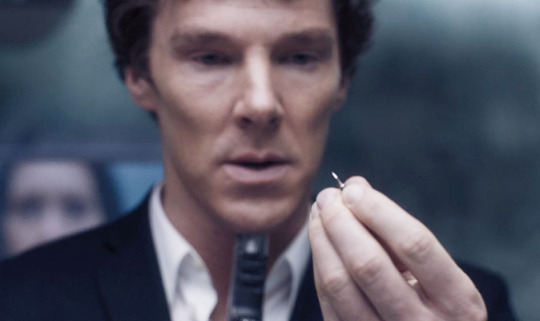
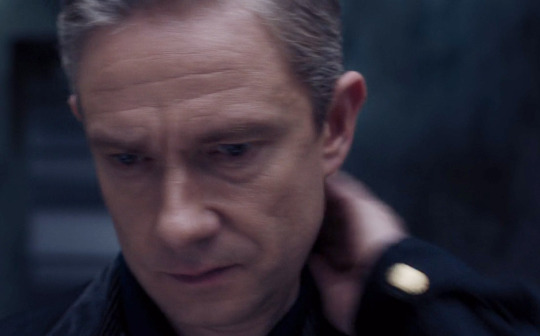
Someone is trying to inject our protagonists with something dangerous, administered by small darts. John tells us, in his blog post, about Swandale: “He was, to be honest, terrifying. And he had his poisoned dart with him.” At the end of the story we learn that someone apparently wanted to kill both Sherlock and John.
But there’s also another criminal involved: “And he had a friend. A big friend. A really big friend. Sherlock recognised him as Phil Dickinson, known to some as The Headcrusher. So, there we were being chased across a rooftop by Swandale and his poisoned dart only to run straight into this bloke who could break me in half with his bare hands.”
And, to top it, a third ‘feature of interest’ (my bolding): “The big clue we had to go on was that Swandale had got hold of the plans of a house belonging to some pop star from the 90s called Giles Conover.”
A quick Google search reveals that Giles Conover is a character from one of the Basil Rathbone adaptations of Sherlock Holmes: The Pearl of Death from 1944:
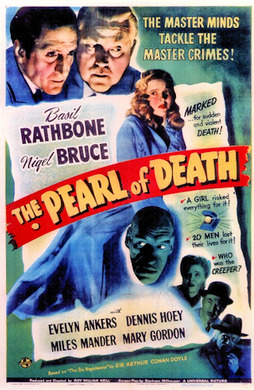
Conover is one of the criminal antagonists to Holmes in the film (which can be seen here), and the other one is "The Hoxton Creeper", a giant man who is known for breaking the back of his victims with his bare hands.
The Headcrusher in John’s blog post doesn’t seem very far from The Creeper in The Pearl of Death, does he? Both are extremely tall men. But this also seems to tie into The Golem from TGG:
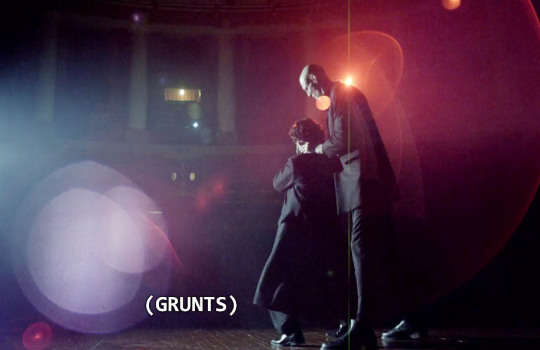
The Golem is not specifically described as “tall” by John’s blogpost The Great Game, though, only as “a monster” and “barely human”:
“He also worked out what had killed the security guard. I say 'what' although technically it was 'who'. But, having seen the man, 'what' is probably a better definition. He was an assassin known as the Golem. He killed people by squeezing the air out of their body with his bare hands!”
“The Golem was there and it killed her. Then, it attacked Sherlock. I don't think I've actually seen him scared before. Me, I was bricking it! I'd seen horror in Afghanistan. But this man was barely human. He really was a monster! I managed to rescue Sherlock (by whacking the Golem with my gun - I never said I was subtle) but the creature got away.”
So, we have two cases in BBC Sherlock where the criminal they’re chasing is an extremely tall man; once in John’s blog description and the other one in the visual description of the show. And they both fit in nicely with this Rathbone adaptation character. But not with canon, as far as I can see?
In summary, we have the following ‘features of interest’:
The Pearls from the Treasure
The Sins of the Past
The Heart
The Poison and the Darts
The Small Man
The Giant
What subtext can we see in this? Well, there’s this couple of male friends - one small, one big. Who might that resemble? ;) There’s also the matter of the Heart, leaning hard on the Sins of the Past. Seems familiar? Then we have the Pearls, connecting to a treasure. But these things seem a bit unattainable, don’t they? At least this far... In SIGN there’s also a couple of twins - Thaddeus and Bartholomew Sholto. One of them - Bartholomew (for some unknown reason) has a chemistry lab in his house, just like Holmes. And he is murdered by the small man Tonga, basically because he wants to keep the Agra treasure. Thaddeus, the other twin, gives (at least parts of) the treasure to Mary Morstan, and he lives. But Thaddeus is a nervous, twitchy little man who seems rather isolated. Is he happy? I doubt it. And he even loses the treasure - the part that he has not already given away.
And finally, there’s the Poison. Why do Sherlock and John always get drugged, or (almost) poisoned? Is their connection so dangerous - is it poisoned? Well, that might be what Sherlock believes, sadly. But the only real, successful poisoners we have had in this show are a) Jeff Hope, b) Doctor Frankland and c) Jim Moriarty. And they’re all dead. But what if the ‘poison’ that Sherlock and John so fear is actually The Chemistry of Love? Administered by Darts = Cupido? ;) ;) ;)
As a little bonus, there’s also another curious detail from SIGN; this illustration by Richard Gutschmidt:
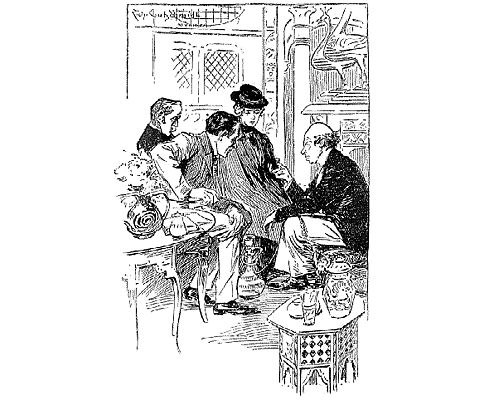
Look at Thaddeus Sholto’s neat little oriental side-table! It does have a high resemblance to this prop from 221B in BBC Sherlock, hasn’t it? (X) :)

Tagging some people who might be interested: @ebaeschnbliah @raggedyblue @gosherlocked @sarahthecoat @sagestreet @mathilderunout @loveismyrevolution @tendergingergirl @tjlcisthenewsexy
#The Sign of Four#the crooked man#the gloria scott#the pearl of death#the poison giant#the six napoleons
72 notes
·
View notes
Text
Sherlock parallels
One of the aspects of obsession is I begin to see the objects of my obsession everywhere in everything.
So, my daughter showed us Sherlock over her winter break, and I couldn’t not see Fantastic Beasts parallels.
Newt, aside from not being a high-functioning sociopath, is comparable to Sherlock with a keen intellect, tracking abilities, other mad wizarding skills, and lacking a penchant for following orders, choosing sides, and socialization in general. His mind palace is an extension charmed case. He annoys people, and they still can’t help but love him.
Jacob, war veteran with a difficulty integrating back into society until he falls into Newt’s world, is John Watson. Devoted sidekick and facilitator of the evolving relational aspects of Newt’s character.
Queenie, lovable innate manipulator with indirect assassin potential and/or dedicated wife potential, is Mary.
Grindelwald, “Will we die just a little?”, is straight-up Moriarty, and he’s also Eurus, master manipulator and master of disguises.
Dumbledore, eliciting Newt’s help with cases that are bizarre (Credence), difficult to solve/dissolve (blood pact), and impossible to fight himself (Grindelwald), is very loosely Lestrade, though considerably more powerful and manipulative.
Theseus is so Mycroftian that as I watched the series I ceased calling the latter Mycroft and just referred to him as Sherlock’s brother Theseus.
Bunty, capable and devoted supporter and hopelessly besotted with a protagonist who will never return her affection *in that way,* is Molly.
Flamel, badass old person with a deep history of badassery and provider of a safe house and supporter of our heroes, is a decent parallel for Mrs. Hudson.
Leta is just a little bit Redbeard. Her childhood companionship and her death both have deep impacts on Newt’s character development.
My adoration of Tina doesn’t quite allow me to compare and contrast her with Irene Adler, though I’m sure their pulses do similar things in the presence of the men they adore, and as much as I’d like to see Tina naked and/or costumed as a dominatrix, that will not be happening 😂. Besides, Sherlock finds the love and sense of family (that he lost as a child) with John, not with Irene. And Newt will have that with Tina. There is no single comparable character for Tina ❤️ in the Sherlockverse.
#fantastic beasts musings#fantastic beasts#sherlock#newt scamander#sherlock holmes#jacob kowalski#john watson#queenie goldstein#mary watson#gellert grindelwald#james moriarty#eurus holmes#albus dumbledore#greg lestrade#theseus scamander#mycroft holmes#bunty#molly hooper#nicolas flamel#martha hudson#leta lestrange#redbeard#tina goldstein#irene adler#obsession
24 notes
·
View notes
Note
hi, do you have any good molliarty fic recs? :)
Of course! Below are some of my personal favorites. Also, you should definitely check out @whyimmathere‘s recent Molliarty post. It’s got lots of fics and the links at the bottom lead to her huge personal collection of Molliarty stories scoured from the internet. It’s a fantastic resource for any Molliarty reader and I’m very grateful for her dedication to this ship.
In no particular order:
Say Something Ordinary by TheWormThatTurns
Chapters: 6/6Words: 5485Rating: Teen And Up AudiencesWarnings: No Archive Warnings ApplyRelationships: Irene Adler/Molly Hooper, Molly Hooper/Jim Moriarty, Molly Hooper/John Watson, Mycroft Holmes/Molly Hooper, Molly Hooper/Greg Lestrade, Sherlock Holmes/Molly Hooper
Additional Tags: Happy Ending, Unhappy Ending, Alternate Universe - Soulmates, Soulmate-Identifying Marks, Alternate Universe
Summary:
Soul mates exist. They know one another, if they meet, by the words on their flesh. The first words they will speak to one another. Molly Hooper is one person amongst millions, if not billions, born with a banal remark on her skin. True love is hard to find. AU. f/f & f/m, mostly the latter.
The Molliarty in this story is only one chapter, but I enjoyed the whole piece very much. It even has a bit of Jim POV!
Daddy by the sublime mime
Chapters: 1/1Words: 643Rating: TSummary: “Let’s play our favorite game.” Jim says. “Let’s play pretend.” -a little dribble, in which Jim is very alive and very angry with our favorite pathologist-
A shortie, but I liked it. Bit of violence in this.
I love you as I love… by CalicoKitten
Chapters: 1/1Words: 3584Fandom: Sherlock (TV), His Dark Materials - Philip PullmanRating: Not RatedWarnings: Creator Chose Not To Use Archive WarningsRelationships: Sherlock Holmes/Molly Hooper, Molly Hooper/Jim MoriartyCharacters: Molly Hooper, Jim Moriarty, Sherlock Holmes, Mycroft HolmesAdditional Tags: Alternate Universe - Daemon, Daemons, Molly is a BAMF, she’s also not as innocent as everyone thinks, Unhealthy Relationships, Death ReferencesSummary:
Molly knows Jim Doyle (because that’s how he introduces himself, hands sweating and shaky, stuttering in the cafeteria) is bad news as soon as she sees his daemon grin.
That doesn’t put her off him. If anything it makes her say yes all the more quickly.
Fantastic story that makes good use of both source canons and also mythology. Knowledge of His Dark Materials is not necessary. There are a few grammar/word usage errors but don’t let that put you off—the story is so enjoyable it doesn’t matter. I’ve read it many times.
I O U by retorica
Chapters: 8/?Words: 20761Rating: MatureWarnings: Graphic Depictions Of ViolenceRelationships: Molly Hooper/Jim MoriartyCharacters: Molly Hooper, Jim Moriarty, Sherlock Holmes, Eurus Holmes, Sebastian Moran
Additional Tags: Psychopath in Love, Loss of Innocence, Molly is his queen, molliarty - Freeform
Summary:
“Are you in love, Jim? Has sentiment overcome your faculties?” (4x03 flashback compliant)
This story. It’s a WIP. Slow to update but so, so good. It’s sort of set in canon? Canon-themed, maybe? I’m not sure how to describe it, honestly, but retorica really amps it up here. Beautifully written and the author shows zero fear of taking turns with the plot.
What Sober Couldn’t Say by ribcage
Chapters: 1/1Words: 4603Rating: Not RatedWarnings: No Archive Warnings ApplyRelationships: Molly Hooper/Jim Moriarty, Molly Hooper/James MoriartyCharacters: Molly Hooper, Jim Moriarty, Toby the Cat (Sherlock)Additional Tags: Drunk Texting, Texting, Happy Ending, molliarty - Freeform, Inspired By Tumblr
Summary:
“(11:23 pm) Drinking again
(11:24 pm) And since it makes me too sad to go on my blog anymore thanks to you, I figured it’s only fair you become my new place to vent
(11:25 pm) You’re probably not receiving these messages anyway so no harm no foul
(11:25 pm) Right?”
Molly drunk-texts Jim over the course of several months.
They say that nuance is lost over text, but Molly’s pain is very palpable here. A large part of this story is comprised of text messages, but the author writes well and the medium works here. Bit of a happy ending. Love this one!
Junior by ll_again
Chapters: 1/1Words: 1907Rating: Teen And Up AudiencesWarnings: No Archive Warnings ApplyRelationships: Molly Hooper/Jim MoriartyCharacters: Molly Hooper, Jim Moriarty, Toby the Cat (Sherlock)Additional Tags: Jim is a cat person, Post-Episode: s01e03 The Great GameSummary:
So what’s a beleaguered pathologist to do when the UK’s Most Wanted turns up to visit her cat?
Lovely writing and ll_again just portrays Jim and Molly so beautifully. This one is a little more lighthearted than some of the other stories here. If you like sexual tension and humor, you’ll love this. It’s great!
A Bedtime Story for a Madman and a Queen by sillythings
Chapters: 5/5Words: 17411Rating: T
Summary: Moriarty stops by to tell Molly a bedtime story.
This might be my favorite of all time. Hauntingly beautiful. The author’s portrayal of Jim is so good it’s stunning. The storytelling here is masterful, and spins stories within stories. It’s dark and loving and just wonderful. Strong Sherlolly theme in this one.
Power in Potentia by sovery
Chapters: 1/1Words: 1268Rating: Teen And Up AudiencesWarnings: Creator Chose Not To Use Archive WarningsRelationships: Molly Hooper/Jim Moriarty, Molly Hooper & Jim MoriartyCharacters: Molly Hooper, Jim MoriartyAdditional Tags: feminist reclaimation of the text, Fairy Tale Elements, Vampires, darkish, (it’s all about the ish)
Summary:
Molly does not imagine that this is how Jim expected their confrontation to go.
Bit of formatting issues in this one, but it’s so well-written it’s worth the read. Not exactly a relationship fic, but I loved Molly in this. A good, dark story.
The Fox by Anarfea
Chapters: 1/1Words: 3767Rating: ExplicitWarnings: No Archive Warnings ApplyRelationships: Molly Hooper/Jim Moriarty, Sherlock Holmes/Molly Hooper, Sherlock Holmes/Jim MoriartyCharacters: Molly Hooper, Jim Moriarty, Sherlock HolmesAdditional Tags: Missing Scene, Season/Series 02, Anal Play, Anal Sex, Dirty Talk, Masturbation, Oral Sex, Sexual Fantasy, Unresolved Sexual Tension, Vaginal Sex, molliarty - Freeform
Summary:
“Close your eyes and pretend I’m Sherlock Holmes,” he murmured. “I don’t mind.”
Oh, the smut. In character, well-written smut. Fantastic story.
Nameless by Ridiculosity
Chapters: 9/?Words: 37733Rating: MatureWarnings: Creator Chose Not To Use Archive WarningsRelationships: Molly Hooper/Jim MoriartyCharacters: Jim Moriarty, Molly Hooper, Sherlock HolmesAdditional Tags: Soulmates AU, i… don’t know, Angst, Lots of Angst, Psychopath Moriarty, normal molly, molliarty - Freeform, lemon tarts, this is so trashy
Summary:
The first name was expected - even welcomed. The second, on the other hand, left much to be desired. And Jim would never understand what it was about it that was compelling. [Soulmate AU: On one hand, the name of your soulmate, on the other - your enemy. Molliarty.]
WIP. On the surface this is sort of a funny story. I smiled a lot reading this. On occasion, though, it delves into pathos, and it’s very effective. I like a bit of pain in stories and this delivers. Well-written and enjoyable.
The Rose Point Manor by BookishTea, Roz1013, stbartsmolly
Chapters: 6/?Words: 17923Rating: MatureWarnings: Graphic Depictions Of ViolenceRelationships: Molly Hooper/Jim Moriarty, Molly Hooper & Meena, Sherlock Holmes & Molly Hooper, Molly Hooper & Original Female CharacterCharacters: Molly Hooper, Jim Moriarty, Sherlock Holmes, John Watson, Mycroft Holmes, Meena (Sherlock), Greg Lestrade, Sebastian Moran, Mike Stamford, Original Female Character(s), Original Male Character(s), Jim Moriarty’s Mother, Jim Moriarty’s FatherAdditional Tags: Mystery, Drama & Romance, Dysfunctional Family, Family Secrets, Alternate Universe - Victorian, Post-Episode: The Abominable Bride, Mark Hooper - Freeform, Costume Parties & Masquerades, Love Letters, BAMF Molly, Molly Hooper Appreciation, Explicit Sexual Content, Explicit Language, molliarty - Freeform, Possessive Sex, Jealous Sherlock, Possessive Behavior, Haunted Houses, Possessive Jim, Female Friendship, Female Protagonist, Abandonment, Past Child Abuse, Emotional Manipulation, Sexual Tension, Murder, Aftermath of Violence, Violence, Minor Sherlock Holmes/Molly HooperSummary:
A young woman struggling in an unjust society takes a break from the theatrics of pretending to be her male counterpart, Mark Hooper, and decides to relax at the quiet but foreboding Rose Point Manor. There she comes to a realization that something far more sinister lurks there than at her morgue back home.
WIP. Still in the early stages but I just love the setup here. Mystery? Paranormal? Epistolary writing? Count me in. Can’t wait to see what’s next.
Quite a few of these authors have multiple stories, so I have linked their profiles too so you can check them out.
64 notes
·
View notes
Text
Moffat and his final problem with women
I can’t help but notice that Steven Moffat does have problems with female characters on his shows. Maybe when you watch a lot of his works, only then you’ll notice it, but it is what it is.
And the problem is? He writes Faux Strong Female Characters (FSFC). Why Faux? Well, here is why:
1) Irene Adler

In ACD’s canon she works for herself, has her own personal life and doesn’t care romantically for Sherlock, is the one who outsmarted Sherlock, departed on her own terms into sunset and made Sherlock actually have respect for women ( “He used to make merry over the cleverness of women, but I have not heard him do it of late” - Watson about Sherlock in ACD’s lore).
ACD wrote this Irene in XIX c.
In BBC Sherlock? Yeah, on the surface she is that cool dominatrix, comfortable with her sexuality, who blackmails powerful clients, has a hold of state secrets and even whips Sherlock at one point. But in the end? She doesn’t outsmart Sherlock at all, in fact she loses to him because of her feelings for him! That’s right, Sherlock is so damn cool and special dude, that Irene loses because of her emotions, using his name as a password for her very important mobile, which contains all the important info she uses as her protection. In a blink she is begging Sherlock, with tears in her eyes, saying that she is toast without her mobile. At the end of episode it gets “better” when Sherlock actually rescues her from terrorists in Pakistan in a total classical damsel-in-distress trope.
Not only that, but we learn from this episode that Irene works with Moriarty and in fact her plan to trick Holmes brothers wasn’t her plan (”I had all this stuff; never knew what to do with it. Thank God for the consultant criminal. Gave me a lot of advice about how to play the Holmes boys” - says Irene in BBC Sherlock).
So Irene in BBC Sherlock needs consulting from Moriarty to work out a cohesive plan, loses to Sherlock in the game of wits because her wits were very much affected by her sentiments towards Sherlock and needs to be saved by him with wielding sword action.
Steven Moffat wrote this Irene in XXI c.
2) Mary Morstan | Mary Watson
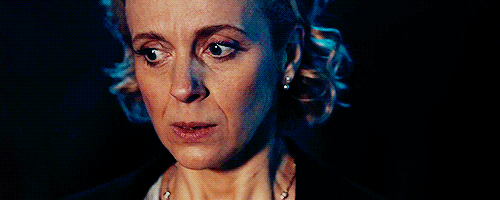
In ACD’s canon she and Watson met because of the case, she worked for some time as governess, they married and then she died.
In BBC Sherlock on the surface she got an upgrade in badassery. She is a former assassin, who now tries to have a new, normal life with John Watson and has a baby with him, very skilled, very clever, with quick reactions, quite an intellectual match to Sherlock and often more clever than her husband John.
Yet in attempts to make a strong skilled character Moffat screws up, cause this really smart, professional trained ex-assassin uses perfume while she goes out to kill a guy who blackmailed her; can’t figure out that her USB flash drive has a tracking device and goes to a meeting with a person, who is responsible for her fellow assassin ex-colleagues being taken down, without any weapons or protection (you know, there’re such things as bullet-proof body armour that could be worn under your clothes in the situation like this, surely ex-assassin should know this ).
And the result? Mary is killed in a most ridiculous fashion by some bored secretary, because she jumped in front of the bullet trying to save-you guess it right - Sherlock from being shot.
ACD also had Mary dead, however without fanfare, silliness and without Mary dying for Sherlock or without giving Mary a little baby girl, leaving this girl motherless as a result of Mary’s death in the name of Sherlock.
Steven Moffat wrote Mary as this super pro, smart and experienced, who at the same time makes spectacular dumb decisions which undermine her supposed smartness and proficiency, who gives up her own agenda, her new life with her husband and daughter, the new life she wanted after retiring and worked for and finally got - because of Sherlock. Because Sherlock is so special and important here, that female character must die for him.
3) Eurus Holmes

The secret sister of Holmes brothers made up by Moffat and Gatiss.
Locked in a secret prision (facility), she is a genius from childhood, killed Sherlock’s best friend when they were little kids, manipulator (can actually hypnotise people with talking or something and make them dance to her tune), master of disguise, can arrange wild games of survival, can escape her prision at her own will, etc. On the surface she is uber nemesis to Sherlock, maybe in some ways more dangerous than Moriarty himself!
But all her talents and wits in the end were all about getting attention of her brother Sherlock and hanging out with him. Yeah, in the end it was all about Sherlock being so special and important that his super smart sister didn’t really want anything else and as soon as Sherlock got a proper hold of her, Eurus was tamed, cause she pretty much didn’t have any other agenda in life. She has visits from her brother now and they can play their violins together. Awww. That’s it!
Apart from making it all about Sherlock (again!) the whole twist with super secret sister who suddenly appeared out of the blue was just bad writing on the level of juvenile fanfiction.
But Sherlock is not the only one of Moffat’s title characters who is that damn special and cool, so female characters must bend for him in that way or another. Look at Doctor Who!
4) Missy

Missy, female regeneration of The Master, the old nemesis of The Doctor.
On the surface she is dangerous, smart, cunning, with evil glee and no boundaries. She can kill and mock, and scheme.
Yet her first plot in the series was to raise the Earth's dead as an army of Cybermen - and give this army as a gift to The Doctor! Missy then suggests that she and the Doctor can still hang out together again and return to Gallifrey together. Eh?
Missy’s last plot in the series was to be saved by The Doctor from execution. Then The Doctor locks Missy in his vault under the university campus - and Missy begins to reform and see errors of her ways! Apparantely nothing helps a woman to reform like being put under lock and key by a guy in his basement and giving guidance to this woman! Her arc ends with Missy wanting to help the Doctor and getting killed because she chose The Doctor’s side.
In other words, the first ever female version of the Master aka Missy died for the Doctor, was tutored by him and basically wanted to hang out with him more than anything else. Riiight. Cause The Doctor is that special, you know.
5) River Song

Professor River Song. Archaeologist, child of Tardis, has a Time Lord DNA, time traveller. On the surface brave, witty, smart, strong-willed. Still she unfortunately got the shades of Moffat’s treatment of his female characters.
She was raised by the Silence to kill the Doctor but fell in love with him and became his wife. In her childhood as Mels she was obsessed with the Doctor, when she regenerated into River Song she entered the University to become archaeologist in order to find the Doctor through time and space. She was ready to screw time and space and history, by defying a fixed point in time because Doctor meant too much too her . As a result time shredded into a reality where all history happened at once. She finally fixed it by fake-killing the Doctor, but then she was sentenced to several life sentences for this murder and served the sentence to make the Silence believe him dead, and though she often escaped her prision to spend time with The Doctor, she always returned to her cel. Like another gig of female character being locked up for the sake of main male protagonist. Okey dokey. In the end River didn’t allow The Doctor to sacrifice himself in the Library in order to save people there, and took his place, dying as a result of this.
The thing is Steven Moffat here has a female character who is very much emotionally fixed on his main male protagonist, who can easily become putty in his hands at times because of this. And dies for him.
See the trend?
That’s why it can be called FSFC.
Sure, Moffat’s female characters may use guns or whips, act dangerously and independent on the surface, throw around quirky and quick-witted lines, have some adventures, use word “sexy” a lot , go against main male protagonist, even go after his life - but in the end they get upstaged by this main male protagonist either because it turns out that they have real strong emotional attachment to him and it makes them lose or give up or join his side, or because this main male protagonist is so special and important in general, that they just feel obliged to make sacrifices for him. Or combination of these variants.
As a bonus: many of those FSFC can be really flashy and have a “bad girl” vibe. Moffat obviously has a kink for “bad girls” and likes to write them, so the main male protagonist, be it Sherlock or Doctor Who, can get an upper hand over those bad girls. IDK, probably it makes it all the sweeter for Moffat. Irene, Missy, River, Eurus all have it in them. Irene is a dominatrix and string-puller and flaunts it; Missy, while cosplaying Mary Poppins in her looks, openly refers to herself as “bad girl” and surely acts like one; River a playful time travelling criminal/scientist/adventurer has enemies-to-lovers trope played out with the Doctor in spades ( “ They engineered a psychopath to kill you -Totally married her"). Eurus has a lot of very, very bad girl about her. Heck, even Mary Watson has some of it in her, due to her dark past as assasin for hire.
This whole thing is very troubling and it seems many of Moffat’s female characters can be "strong” only until they submit (in one form or another) to or in the name of main male protagonist. Because Moffat’s main male protagonists are that cool and special and awesome, so it must be about them and their awesomeness in the end, when the dust settles.
#sherlock#bbc sherlock#steven moffat#doctor who#bbc dracula#irene adler#missy#eurus holmes#mary watson#river song
102 notes
·
View notes
Text
Why it doesn’t matter anymore whether the lostspecial’s “revelation” is genuine or if there’s a 4th episode
First thing to say is this: I never post anything, I live in the shadows, and enjoy taking part of TJLC behind the anonymous’ face. I have followed several tumblr account from a long time. I have been part of TJLC since the day lsit created her blog, the day after TSoT. In other words, I have seen my fair share of mindfuckery, of blogs I liked receiving hate but I have never taken an active role in this fandom until now.
Like many TJLCers, I decided to watch TFP having high expectations, knowing for sure I was about to witness something groundbreaking.
Well, I wasn’t wrong. Not really.
First came disappointment: so was everything a farce? A pure publicity stunt? Even the lostspecial website is a lie? Are we that desperate for something to be clever?
And then I was thinking… So what if we are? None of this makes sense anyway. Why shouldn’t we ask for a miracle?
Here’s the thing, when you rewatch that fuckery that is TFP, if you start explaining with knowledge you get at the ending, everything falls apart. Oh, this is Eurus, she’s on a plane and needs Sherlock’s helps but also Eurus cuts the communications and uses herself as a bargaining chip. Continuity? What’s that? Sherlock wear the Bellstaff because I say so, even though he didn’t have it when he decided to shoot himself.
That’s the point casuals decide the Sherlock show was that bad and move on. That’s also the point people with a brain and loving puzzles decide to dig deeper. In half a week, TJLC (+ the new TFHC) was back on scene, tearing apart the narrative and saying: that cannot be real, therefore it’s not. But they didn’t use shitty arguments, they didn’t decide to let logic flow out of the window, in fact, they used what the narrative gave us unlike many say, they were the most logical out of everyone actually.
So, there, we’ve proved there’s more at work, we know our show, we know who the bastards behind this are. They’re fans, like us, and what do they want, what do we want?
We want a miracle. We want Sherlock to survive the Final Problem, to escape the Reichenbach’s Falls and let him be true to himself. We want no loose ends and there are so many, we want what others have said for years to come true, we want Sherlock out of the closet, after more than a century. The Final Problem can never be the end, otherwise all is lost. You cannot be allowed to destroy your show there if you’re a fan.
So, people start to look for the Lost Special, an episode TEH proved Mofftiss knew and they found the disaster that was ATY. At that point, I admit, we could have been convinced we were wrong. It wouldn’t have taken much, just a few words from the Powers That Be that they’re sorry to have lead us on, something official, not a tweet dismissing the last years as a ludicrous fantasy. What we got instead was radio silence and another show thinking, let them think what they want, that’s good for us. ATY said no, but it was a little no, one that means, what don’t you try to find it yourself? Who knows what you’re going to see ;)?
So 22/1 wasn’t the right solution, okay. How about 29/1, that’s the day they met, you can’t go wrong with this, right? Apparently yes, but by the time we noticed, we had to bear watching two people with no chemistry fuck within the 7 first minutes and end with a rape while we need to beg a 7 years old show to finally address the elephant in the room and to have the protagonists say they have Feelings™.
That’s roughly the moment I started thinking, maaaybe there’s no 4th episode but then, what about these hundreds of meta confirming my suspicions? People smarter than me have built foundations for these ideas and here’s where it hurts: it makes total sense, it fact it’s so far the only way S4 can make sense and be bearable, even enjoyable.
Yes, what TJLC says is ludicrous at first glance, that’s the most insane thing I’ve heard. I mean, a true conspiracy? A fourth episode hidden in plain sight? Who can even believe in it? How improbable is that?
But once you’ve eliminated the impossible, what remains, no matter how improbable, how insane it seems, must be the truth.
Here’s what we have deemed as impossible: these two men cannot have made this shitty S4 accidentally. Gatiss is a gay man working for queer people to get representation in medias, Moffat turned Sherlock and John into Vastra and Jenny, two lesbians who kissed on screen on a children show. Moffat is a good writer, Heaven Sent is evidence enough and TAB’s last scenes proved they get what the heart of the show is. We have people who are good at their jobs, writers, actors, and there is no way so many of them fucked up so much at the same time. Not even BBC’s advertising team. Not when the stakes are that high.
Here’s what we have deemed as improbable: Mofftiss wants us to crack, they are two men with enormous egos who want to leave their mark in Sherlock Holmes’ history. Permanently. They love an adaptation who didn’t succeed in making Holmes gay and have decided to get the story right. They want us to cry bitter tears of relief, they want to pull the rug and say after the fact: see? It’s always been a love story, you saw but you never observed. It’s always been a story of love, a story about a detective and his blogger who keeps him right, about two broken men who managed to find happiness together and do great things. To reach that goal these two bastards are willing to play a very long game, to mindfuck everyone and break the fandom before mending it.
Here’s finally what seals the deal: when you start thinking you must add the ‘it’s not real but everything is a metaphor’ and ‘we are the missing piece, we are part of this,’ everything makes sense. In fact, that’s the only way it does. TJLC had predicted every plot point in TAB? They have managed to get back on tracks their deductions, they wobbled but didn’t break. They are nit-picking on details but widely agree on the big things. I dare anyone to give another explanation for S4 without using ‘the writers are that bad’ as a reason for relevant plot points. The more you search, the more you find that goes on that direction.
Now, people had found a website they were wary of but decided to go down the rabbit hole in hope of finding something. The people in charge of this site now say more than a week later: by the way, none of this was real. The codes? Made up. The pictures? Also made up. The lines on the code sources? We wanted to see how desperate you were. Some people even tried to see things that weren’t there in the 27kra video (thanks, but I noticed in the end I was wrong and let it go immediately). Look how stupid TJLC is, how much in denial these people are. There is no 4th episode and there never will be. Carry on, you silly child.
It’s too late.
I’m not saying this explanation isn’t possible. Maybe that website was a fake after all but too much happened. Several blogs received many encrypted messages and reveal that someone is playing with our nerves, someone clever and who has too much time on his hands to be a hater. Sherlock North happened, disturbing codes and messages were sent, thelostspecial.com happened and had things he wasn’t supposed to have on his site, we are 100% convinced at this point that they want to break our faith, nothing now will change our mind. Even if several trolls took part of this, the snowball effect is there and you can’t stop it anymore. And with dymm (who may or may not be a mole) having excited twitter and even causuals non-stop for a month, the idea cannot be banished anymore.
Here’s the truth of this: it doesn’t matter at this point if there is or not a 4th episode. Sherlock’s show has an enormous hole and they need to do something to save it. TJLC managed to give an alternative reading that makes 100% more sense than anything else. Even if (which I doubt) that hadn’t been Mofftiss’ point, they need to take what we have thrown at them to save themselves. Here’s the real Final Problem, what’s it’s always been about from ACD’s time: how is the fandom going to save Sherlock Holmes?
Make history, is what we tell them today. Dazzle us with your cleverness, prove us we were right to believe in Sherlock Holmes. Open the closet you’ve put yourself in, we’ve found the key and got your back. And if, somehow, we are wrong in thinking you are half as clever as we think, then what you did, all that queerbaiting was disgusting and we are going make history anyway. Sherlock Holmes doesn’t belong to you. We, the fandom, is the reason he is still alive and we won’t let you kill him without putting a fight. This isn’t about being in denial anymore. This is us, telling the authors how it’s going to be.
172 notes
·
View notes
Text
Four episodes, three false narratives, two potential outcomes, no loose ends.
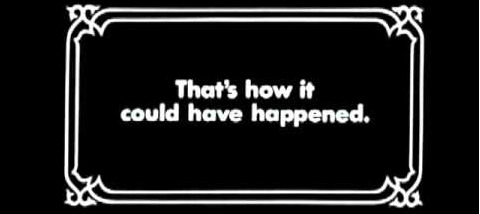
ACD Watson was known for regularly publishing cases in The Strand with
1. The names changed,
MYCROFT: That's the trouble with uniforms and name badges, people stop looking at faces.
2. The locations changed,
MARY: No, I-I-I mean how did you find me? No, really, though, how? Every movement I made was entirely random!
3. Basic facts of the case entirely rewritten to avoid self-incrimination.
SHERLOCK: That’s now how it happened at all.
These three episodes are a set. They’re all retellings of the same events, pieced together from the limited information that John is willing to divulge, supplemented by imagination and colored by the author’s own feelings and motivations. Fresh paint to disguise another smell. Throughout all three episodes, we see wildly diverging narratives inspired by the same core kernels of truth. The fourth episode, the final ending of Clue, will tell us what really happened.
Cut for clarifications and updates.
Three false narratives
Moffat: Also, if you read [The Adventure Of] Charles Augustus Milverton, Dr. Watson in the opening paragraph tells you that he’s about to tell you a porkie. (x)
1. The opening scenes of T6T: Mycroft &co are rewriting the events of the HLV finale while Sherlock looks on. This episode is Sherlock absorbing evidence from John, listening to him tell his story, and calling bullshit. “That’s now how it happened at all.” Sherlock fills in the gaps and lies with his own deductions and fabrications, resulting in the story we see being told, but seeing as he has a massive blind spot when it comes to Mary (and John too, frankly), he’s no closer to the truth.
2. The opening scenes of TLD: John in therapy, volunteering as much information as is typical for him. John, our precious son, is terminally incapable of talking about himself and his feelings, so the rest of the story we see told in this episode is John projecting his deeply repressed issues, his darkest secrets, onto every other character in his story. Getting it off his chest without getting it on yours.
3. The opening of TFP: Mycroft Mark Gatiss is watching a romantic movie when it’s interrupted with a real-life horror movie plot. “Someone convinced him that you wouldn't tell the truth unless you were actually wetting yourself.” This episode is more true than the first two, but it’s filtered directly through John’s appalling self-worth and takes place in his bleak sexuality bunker. John casts Sherlock as the action hero protagonist even in his own mind, and the happiest ending he can imagine for them is one where “who he really is” doesn’t matter. Somebody help him.
Each episode, the writers tell us, just like Watson does, that they’re about to tell us a porkie. The first endings to the Clue Movie. The final ending, the fourth episode, The Lost Special, tells us what really happened.
Eurus the Scapegoat
SHERLOCK: I see. Who is supposed to have shot him, then?
SIR EDWIN: Some over-eager squaddie with an itchy trigger finger, that’s who.
When Watson writes up the Milverton case, he [according to the Mofftiss reading] invents the character of the woman who shows up in the dead of night to kill Milverton in order to cover for the fact that it was in actuality Watson who went there with the express purpose of killing Milverton himself.
So what has been edited out of the three episodes that we’ve seen so far? The thing we were devastated to not have seen in the third episode last Sunday?
Their romantic love.
Well, I’ve got something “they” would dearly love if only we could get out of here. I’ve got ammo.
The ammo/amo connection is made so that we can take a parallel leap in Greek from Eurus to Eros. In the three stories presented, John uses the fake villain of Eurus to explain his actions that were, in reality, motivated by Love.
Reaching out to E Sherlock via text? Motivated by Love.
Reaching out to Sherlock, coming to 221b in the middle of the night for help, because he’s Faith’s John’s last hope? Motivated by Love.
Reaching out to a new therapist who reminds him of Sherlock after Mary’s “death”? Motivated by Love.
“Mr. Archer, on the count of three, shoot Dr. Watson.” As in, The Blind Archer by ACD? Also known as Cupid? Also known as Eros?
She finally hit her mark.
In John’s mind palace bleak sexuality bunker, Love has been kept prisoner since they were children. She wreaks havoc on everyone she speaks to, beguiles them, reprograms them. She tells Dr. Taylor to kill himself and his family. Love taught Sherlock to play violin.
Love is what caused all these things. Eurus is the scapegoat. The over-eager squaddie with an itchy trigger finger.
Can Samarra be avoided? Two possible outcomes
In T6T, the car crashes; the drunk driver is pulled from the wreck and the gay kid is found already dead. In TLD, the wildly-driven car arrives safely and in time to get the needed help.
In T6T, the tea tray crashes to the floor as Ajay the John mirror is killed(?). In TLD, Sherlock throws down his gun in time to catch Mrs. Hudson’s falling teacup.
John doesn’t care if he dies, but more importantly, he doesn’t believe that Sherlock would care if he dies. He’s never had to say “vatican cameos” to Sherlock before. When he says it in his mind in TFP, Sherlock ignores him. Sherlock deletes his texts, after all, doesn’t he? John reaches out, through Eurus, to Sherlock, again and again, in these small ways he knows how, without risking his true feelings and the ultimate rejection. But John is at the bottom of a well. At the end of his rope.
He even leaves Sherlock a note. Isn’t that what people do? Leave a note?
Golf Whiskey X-Ray, this is a distress call.
So we return to the problem. The Final Problem: Staying Alive. The Appointment in Samarra.
Sherlock rejects Faith’s case for being boring, but at the last second he stops her and stays up with her all night in order to keep her from harming herself.
Don’t solve the murder. Save the life.
Both paths from here have been illustrated in the three false narratives to an extent that I think this will be a major turning point of the finale, possibly with Sherlock pursuing hypothetical scenarios in his Mind Palace before he understands he must choose John over Mycroft, just like he does in John’s mind in TFP.
That he must choose love over logic, as real of a dichotomy as that has ever been.
“Lost without your love.” “Save my soul, seek my room.”
“Save John Watson.”
----------------------------------------------------------------------------------------------------------What are the kernels of truth that show through the coat of paint?
Kernel of Truth: The Knife
Kernel of Truth: The Car and The Driver
More coming soon...
Major thanks to Ariane Devere’s transcripts, as always, as well as the friend I’m staying with who’s being very patient with my tinhatting at the moment.
1K notes
·
View notes
Text
The Fan Rebellion and the Last Season Jinx
As I said yesterday about Sherlock, I've definitely observed that a lot of people think that the last book or the last season in a series is often... problematic. If you've been in enough fandoms, you'll see this is a very common phenomenon. It's also very common for people who're particularly attached to a pairing or a character to feel 'cheated' and rant irrationally at the creators (unfortunately). As I said, this is just what fans and fandoms are *like*. I literally-- literally!-- cannot remember the last time a final season or book truly pleased most diehard fans, or there was a lack of wank at that point at least. Being a diehard fan means being unreasonable to some degree, and when you translate this to the way most people act on the Internet, it's a matter of trolling waiting to happen. My point is that there's certainly plenty of pure wank, and this is what people who're frustrated with the discourse often focus on. As for me, I'm more concerned with the fact that most of the more thoughtful metas aren't really... that much better, in terms of the depth or closeness of analysis being performed.
In general, I've been thinking that fans are often most frustrated when they feel that things didn't change enough, so the writers actually kept going with their MO in ways they'd hoped *would* change, while adding new stuff they feel unprepared for. That type of rug pull or 'gut punch moment' Moffat said he likes so much is actually something many fans tend to hate, especially when they're simultaneously confronted by the fact that many of the undesirable aspects of the style remained. This was a huge problem one could see with the overwhelmingly negative critical and fan response to the 'transgressive' approach Gatiss took with 'The Final Problem', as I've written about recently. Of course, this is also precisely what happened with Moffat and Gatiss's clear, consistent interest in queer subtext (largely remaining just that). It *feels* like a bait and switch, leading to claims of the lack of character progress combined precariously with criticism of the apparent inconsistencies.
In the Raven Cycle fandom, I've noticed the more mature sounding, analytical drive-by critiques of 'The Raven King' saying that the characters didn't grow enough, at least aside from Ronan and Adam. That is, the others' arcs didn't *resolve* enough. This is definitely a common refrain for the last book or season of a show, when people come into the story with a lot of preset expectations and projections onto the text. In the case of the last book in The Raven Cycle, it's common to see people say that Noah in particular just disappeared, somehow. And this critique is always presented as being somehow more hard-hitting than pure squee about the books, a sign the person is thinking deeply and critically about the text. In fact, it's generally a sign that they didn't pay enough attention to the story.
Do many narratives actually go off the rails at the last minute? Sure, yeah. But it seems to me that if your critique is primarily that things about the characters didn't change *enough*, or they changed in the *wrong way*, then that warrants a second look. It's a sign there were certain expectations being applied, certain standards as to what sort of thing qualified as a 'resolution' as well as what *needed* an explicitly textual resolution to start with. And unlike these fans' implicit assumptions, there's no rules about what a writer would *have* to address explicitly in terms of characterization and what they can leave to be inferred or simply understood by connecting the dots of related events.
It's hard to say exactly what any given fan thinks Maggie Stiefvater failed to resolve in TRK. Everyone seems to have their favorite axe to grind. I *can* say there is textual support for them being wrong about Noah, and this whole complaint is a misreading of his entire character from the start. Conversely, stuff to do with Gansey and Blue is more difficult because it's more complex and works with more of people's ingrained projections and assumptions about the characters, and what the two of them need in the first place. No one wants to think they've misunderstood the story, but my point is that this is relatively common, at least as common as stories suddenly turning bad at the last stretch, surely. I'd say more common than that, 'cause writers generally do have editors and some sort of existing plan for their characters.
Basically, when the last part of a story makes the mismatch between the audience's headcanons and the reality of the story all too apparent, most people clearly choose to blame the writers rather than reevaluating any of their existing readings of the characters. And this happens even though there's generally a mix between the audience misunderstanding and the writer's failings.
A lot of times, I think part of the problem is a mismatch of priorities. It's not that the last book or season generally just *ignores* the issues at hand, but the writers may have had other priorities that they chose to take center stage. Fans are usually pretty resistant to any such last minute shift in priorities (so many people resented the importance of Henry Cheng in TRK just 'cause he was new, just as many people really weren't thrilled with Eurus being so important in Sherlock Series 4). Basically, the character arc may turn out to be more of a case of character *growth* or development instead of a formal arc the way some characters may have. And needless to say, this isn't okay for fans of that character or people who thought they were 'important' enough for a more explicitly central role.
Of course, simply focusing on a different character-- such as making Adam and Ronan's arcs the core of The Raven Cycle, or keeping Sherlock alone as the protagonist of BBC Sherlock-- isn't actually a writing mistake. This is complicated for people who thought they were reading or watching an entirely different story, though, because an apparent shift (or final adjustment) in focus can seem to change the nature of the narrative as a whole. It's not even a misreading at that point: it's that you may think you're reading a story about Blue, Gansey and friends at the beginning, or it's a show about John and Sherlock's adventures and friendship. And then, boom! It hasn't really been about Blue after all: she's just the necessary mirror and introduction to the Raven Boys. Similarly, the show is not really about John and Sherlock's relationship, in the strictest sense, but primarily about *Sherlock*, whose central relationship is simply with John. That changes things... too many things, for many fans, who simply find they cannot accept it. After all, it still feels like losing something you loved.
Like I said, though, this isn't to say that Gansey and Blue's relationship (or John and his relationship with Sherlock) wasn't developed and resolved in the end, even if this wasn't the *kind* of resolution fans expected or wanted. That's definitely a difficult thing to wrap your mind around, and requires viewing the story impersonally-- or at the very least not taking what happens to your favorite characters *personally*, which is a tall order for anyone who's emotionally engaged with a story to start with. I'm not even sure it's *desirable*, really. It just kind of comes naturally to me, whether through personality type or college training.
Finding that seemingly missing character development calls for a certain type of engagement and close reading that I think most people either rarely engage in or only engage in if they're absolutely in love with the story. Basically, the John or Gansey type of characterization thread is part of a secondary (implicit or subtextual) rather than the primary narrative, so you have to look closer, read more deeply and generously. This is something which most disgruntled fans aren't apt to do. That's what I meant about many of the critical readings being a bit desultory or sloppy, more concerned with letting off steam than analyzing the text open-endedly. As I'd said yesterday, the motivation for most critiques in general is such that they don't lend themselves to making close, loving treatises. And in the end, the pay-off isn't very dramatic, anyway. As Ivy showed in her recent reply to me, the pay-off for John and Sherlock in TLD is almost entirely implicit and between the scenes (or lines). And well, the fact is that at the end of TRK, Gansey's King is found to be dead. He hasn't had a heart-to-heart with Adam except about Ronan, and I suppose it seems that some of the problematic aspects of his relationship with Ronan himself haven't been... fixed (although I'm far from sure they *needed* explicit fixing). Not exactly thrilling. And then the author says that he still can't kiss Blue. It's enough that that many people have to ask: is that part even *real*? It certainly doesn't *feel* real to them.
In the end, I'm a 'cold-prickly' kind of reader, so I don't mind those kind of understated emotional resolutions too much. However, this may actually not even register as any kind of resolution for many 'warm-fuzzy' types, who associate resolution with direct emotional pay-off. Because of that underlying assumption that a character resolution would automatically be *satisfying* and feel good, anything that isn't positive or satisfying will then presumably have to be called unresolved.
Essentially, my point is that character or plot-based resolution can certainly occur off-screen, or lack true emotional pay-off. For example, I've described the talks between John and Sherlock in the show, and they're all full of unspoken things: they're frequently being interrupted, are incomplete, or are otherwise unsatisfying in some way. This tendency of only hinting at things, or the characters not explicitly *saying* what they mean is typical for Moffat and Gatiss's work; Moffat has said he doesn't consider it a plot hole (or otherwise incomplete) if something is simply *unexplained* in the text. He expects the engaged viewer to fill in between the lines, as Ivy describes doing after TLD. Clearly, the question of whether one's viewers choose to grant the text that sort of courtesy is another thing altogether.
#raven cycle#raven ❤️#writing#narrative#the great divergence#sherlock feels#steven moffat#mark gatiss#series 4
14 notes
·
View notes
Text
Sherlock S4 = Act 4? Falling Action
I’ve briefly explained my idea how Sherlock can fit into the Shakespearian 5 Act Play Structure in this post and now I’m going to ramble a bit a lot about Series 4 in detail while I’ll try to keep in mind what I want to write about.

I must mention that all the following potato rambling under the cut is my reading of the events and my mere attempt to make some sense of S4.
Any coincidences with other metas show that we are all Anderson. If you know any metas about the topics below, please let me know and I’ll read them and credit them here.
First of all, it’s hard to decide where we can draw the line between Act 3 and Act 4 because in between there is TAB. We have to decide where to put it. Now, we have two three theories:
Sherlock’s journey in his Mind Palace started back in HLV, after Mary shot him (and at this point, opinions seem to differ - again)?
Sherlock goes into his MP after he got on the plane in HLV??
we are in Sherlock’s MP since TRF???
Guys, this EMP theory gets weirder and weirder, and I needed to step back and give it a go for myself to decide where I should draw the lines. I was thinking about it a lot after wiriting my starting analysis (or meta or how should I call it) and I got more confused the more I was thinking about it. It’s totally nuts.
So, I decided that I’m going to be basic and S4 = Act 4. That simple it is. Because it is what it is. Or is it?
Of course it’s not. I’m using the basic EMP theory that some time ago Sherlock dived into his Mind Palace and he’s still sinking (or falling, as you like it).
I created a shitty explanation image how I imagine the place of TAB and S4 in the structure of 5 Act Plays. I hope it helps.

(Did I mention how I hate that my dashboard stretches pictures that aren’t wide enough?)
I collected some definitions around the web that helps to understand the meaning of Falling Action.
Wikipedia: During the falling action, the conflict between the protagonist and the antagonist unravels, with the protagonist winning or losing against the antagonist. The falling action may contain a moment of final suspense, in which the final outcome of the conflict is in doubt.
Storyborad That: The opposite of Rising Action, in the Falling Action the story is coming to an end, and any unknown details or plot twists are revealed and wrapped up. (I used that description in my previous analysis.)
Letterpile: During the Falling Action, the conflict between the protagonist and antagonist finally comes to a head, and a clear winner and loser are determined. The main character often experiences a 'False Victory' or 'False Defeat'. As you may have deduced, a 'False Victory' is punished with a final defeat, while the 'False Defeat' is rewarded with a true victory. This is readily apparent in tragedies, action, horror, and romantic films. This Falling Action may also contain a final moment of suspense, in which one or more possible outcomes are in doubt until the Resolution.
My favourite is the description that Letterpile gives for Act 4 because it’s more detailed that the others. So, let’s examine it!
I’m explaining things with the help of EMP theory so I assume that we are still in Sherlock’s head.
“The main character often experiences a 'False Victory' or 'False Defeat'”
In Sherlock, it seems like the main character got a victory. He learns throughout S4 that emotions are not a disadvantage, they make him a better man, and with embracing his emotional side he can defeat his enemy who this time is himself his own sister, Eurus who was lurking in the shadow all in his life, apparently.
I believe (and many other people who are cleverer than me) that Eurus symbolises Sherlock’s dark, cold, rational, emotionless, logical side so she doesn’t really exist outside Sherlock’s head. Eurus is the side of Sherlock that he would have become if he hadn’t met John. It’s pretty obvious from the parallels and mirrorings... with a big fucking glass that reflects as a mirror and it suddenly disappears when Sherlock meets Eurus and their hands merge together ASDASDFF. Could they be more subtle? We don’t have to think hard about symbolism while watching TFP to understand all of this. And I assume we’re still in Sherlock’s head so it makes more sense reading S4 this way.
But why this victory is false?

Look at the picture above. That’s why. We can’t count how many loose ends we have, and what did Mycroft say about them? “Not on my watch.”
We have more loose ends after S4 than before, and the loose ends we’ve already had before S4 aired aren’t explained. (*coughs* The Reichenbach Fall *coughs* That still bugs John. *coughs* For example. *coughs*)
“I will burn the heart out of you.” resolution. We were pretty close to this during the whole S4 to see Sherlock’s heart burn out, maybe closer than any time. But Sherlock defeats himself Eurus with his emotional side, and it seems in the final minutes that everyone has got a happy ending in the surface.
According to the EMP theory, Sherlock tries to burn his own heart out but he fails and accepts his emotional side? I’m conused here a little bit. He doesn’t even need Moriarty, he wants to do the work for himself. I’m still more conused.

[Nice revisiting of the climbing-out-of-MP scene in TFP, Mofftiss. Well done.]
The lamp in Sherlock’s hand symbolises his heart, I believe. In all the darkness that is surrounding him, it’s the only light that’s flickering, the beacon light of hope. It has to burn to give light and life, and defeat Eurus the darkness.
We see how Sherlock’s MP lights up after Moriarty mentions that “John Watson is definitely in danger” in HLV, and in TFP suddenly a lamp appears when it comes to saving John Watson. Coincidence? I think not. Sherlock’s darkening MP lights up again when he thinks that he can save John again. He’s not falling anymore, he’s ascending, lighting up again the rooms of his MP which explains the brighter lighting of the final montage of the series.

He literally lets the light into his rooms that suggests a bright, happy end. But it’s a false end if we believe the description that “a 'False Victory' is punished with a final defeat” in Act 5. I really hope that this part of the description won’t fit in, and Mofftiss will turn Sherlock into a Shakespearian comedy and we’ll see marriages everywhere because our boys deserve happiness! *goes in the corner to sob for 5 mins*
But first, shit has to hit the fan... again. But that will be the problem of Act 5.
Correction, or other explanation of ‘False Victory’ or ‘False Defeat’: As @ebaeschnbliah and @isitandwonder pointed out, if we assume that Eurus is Sherlock’s cold, pure brain side he cannot really defeat her. It’s a False Defeat because he needs his brains to still be Sherlock Holmes. Yes, the defeat of Eurus is not real. He embraces her = he embraces his darker, only-brain side. We can see in the montage that Sherlock visits Eurus from time to time to play a duet, to communicate through music, which means synchronization between the two sides of him. They are playing in harmony.
This ambiguity of the terms ‘False Victory’ and ‘False Defeat’ are very interesting, and I can only blame my pessimistic brain that I didn’t recognize this sooner. Thanks so much for the clarification!
Sidenote: Maybe we see the bottom of Sherlock’s MP in the mortuary in TLD when he looks like he wants to find something in his head but he cannot reach it? That bright white light flashes up, then everything falls back into these blue-grey shadows. And we can’t see any more deductions like we are in Sherlock’s head until he solves Eurus’ poem.
And the contrast between cold colours and warm colours in this series means the struggle between brains and heart? But that’s colour theory.
“This is readily apparent in tragedies, action, horror, and romantic films”
Tragedy? Check.

And it looks pretty framed, huh? In every meaning.

Action? Check.

Horror? Check.

(That clown, tho... I wish Mycroft would have shot him.)
Romance? Check.


And here is Sherlock, the fairytale prince, dashing through the night, with light in his hand = hope in his heart.
Of course we can apply this to every series more or less because Sherlock operates with all of the genres above.
“A final moment of suspense “

Thank you, that’s all I wanted to show here.
They. Fucking. Freeze. Before. They. Jump.
* Also, I’ve found a cool prezi about the structure of the 5 Act Plays and guess how is it called there? NIGHTMARE STAGE! FUCKING. NIGHTMARE. STAGE. And I’m not sorry for the swearing because my mind’s just blown away by this. Because by applying this description of Act 4 to S4, all of the fuckiness makes much more sense. IT’S ALL A FUCKING LONG NIGHTMARE! Can you believe it? Because I can’t... It must be just a coincidence.
**I did some research in this particular phrase and no other sources mention Act 4 as nightmare stage. But it’s fun to play with the idea around.
P.S.: I’m a lazy ass for not explaining in more detail how the genres apply to Sherlock but it’s obvious enough with the pictures, I think...?
If you haven’t read it yet, @gosherlocked found some evidence that this idea of Sherlock being a 5 Act Play is not a theory anymore. IT’S HAPPENING!

How does exactly S4 fit into this “play within a play within a play” thing?
Phase 1:

That’s how I originally imagined the layers of The Play but I’m starting to realize it’s much more complicated than I first thought.
Phase 2: If we assume that S4 takes place within the realm of TAB and we draw parallels, we realize that they leak into each other by replicating scenes and characters, and it sometimes feels like that our characters still hold some characteristics of their Victorian selves. Just some things out of the top of my head
Though Sherlock and John call each other Sherlock and John, the distance between them is more obvious then in TAB.
Sherlock doesn’t feel he’s entitled to sit beside John in the sofa in John’s house in TFP (and in TST he’s the spectre of the baby shower and the christening).
Mary’s characterization in TST with that letter to John after she runs away. When the fuck did she call John “my darling” outside Sherlock’s head?
Mrs Hudson got more lines by demand? BAMF Mrs H. FTW! Also, can someone explain me what she means by she’s “not a civilian”? Then who are you, Martha Louise Hudson?
It looks like for me that Sherlock hasn’t really woken up from his Victorian hallucination.
(I’ll create a better diagram when my schedule allows it.)
Phase 3: The circle closes and real memories start to leak through the layers of Sherlock’s MP besides the fabricated story of TAB?
Note: Thanks for the screencaps for kissthemgoodbye.net
And some people seemed interested in my previous potato post so here we go again...
@isitandwonder @loveismyrevolution @holmesianscholar @ebaeschnbliah @tjlcisthenewsexy @sofini @posh-boy-clever-boy @sarahthecoat
(My next potato will be about TAB because I go backwards if anyone’s interested in it.)
#tfhc#tinfoil hat club#tinfoil hat#tinfoil deerstalker#sherlock s4#bbc sherlock#sherlock meta#shakespeare and sherlock#sherlock 5 act play#my meta#rambling#just keep on with your scrolling#we are all anderson#anderson#s4 meta#idk#i put my potato out there and wait what will happen#emp#emp theory#play within a play within a play
55 notes
·
View notes
Text
The Final Problem 2
I can't stop thinking about Mycroft, I kinda wish I could watch a show with him as protagonist, I'm kinda obsessed with him. You see, the moment he apeared in the first episode was and still is one of my favorite moments of this show, the dialog between him and John was amazing, the two actors play each other wonderfuly and I wanted to see more of Mycroft, I wanted to know him.
I did get to known little bits through the series, but last episode had so much info about Mycroft that I can't stop thinking about him.
I'll start with the way Mycroft smiles when he sees that little bit of the old family video, the way he smiled IN the video when Sherlock jumped over him. I start with these because they tell me that Mycroft isn't an unemotional person at all!!
I guess what happend with Eurus changed him too, maybe even more, because he does remember everything and what is worst he had to take care of the matter later on.
Think about it... he was a child himself, but even back then he was the second most intelligent person in that family, he was the one asking Eurus the poignant questions, he understood what her answers meant. We see in the family video that he clearly loved Sherlock so I have to asume that he loved his little sister somehow, and he was the first to see that she had some kind of problem or ilness.Then his little sister kidnaped his brother best friend and killed him, "she started calling him drowned Red Beard, so WE made our assumptions" he says WE. How old was he then, twelve, thirteen? He was A KID! "Sherlock was traumatized" he says... I bet Sherlock wasn't the only one! After all Mycroft, unlike Sherlock, remembered everything!
I can't shake the way he so easily maintains the lie:
John: "Red Beard?"
Sherlock: "My dog"
Mycroft: ... total silence.
Actually, have Mycroft ever said that Red Beard was a dog?? (I'll have to watch the serie again)
After what happened with Victor, and I don't how many years latter, he starts working with the goverment and he learned that they want to use Eurus gift the same way they use Mycroft's and Sherlock's. So they used her, but Mycroft become the goverment at some point in some way and then is HIS job to use his sister! Remember the "I worry about him. Constantly"? I bet something that he worried about his sister as well.
Oh and how Mycroft worries about Sherlock, how he loves him, how he wants Sherlock to hate him so it would be easier for Sherlock to kill him. THAT IS LOVE!
And.. and... can you imagine the terror Mycroft must have felt the moment Sherlock killed Magnussen? I imagine Mycroft was always afraid of his little brother becoming a murderer like their sister and there he was, in direct line of view of the moment his brother DID become a murderer. And that's not all, nooooo, because he was the one responsable to tell Sherlock what his punishment will be, he had to send his brother to a death sentence!!
Then we have the way his parents treat him at the end, it hurts me so much, it also serves as a mirror I think, they treat him almost the same way Sherlock has been treating him all through the series, but this time Sherlock has an inside view of his brother motivations, this time Sherlock comes to help him, when always has been the other way around. But most importantly here, to me, is that their parents look quite unqualified as parents. For all we know they didn't take care of their daughter, uncle Rudi did, whoever the hell he is, and when he couldn't (who knows why) take care of the situation anymore, Mycroft did. And he truly thought it was a kindness, Mycroft's life is all surrounded by secrets he keeps in orther to make other peoples lives more easy... all the fucking country if you think about.
It is no wonder that he tries not to feel anything at all, the simply amount of responsabilities he has are suffocating, he can't doubt himself, he can't drowned in gulty, he has to be practical and cold, he has to close himself to everyone. To the point that no one knows him, no one, not even his family.
And there are his parents:
Mother: "You should've done better"
Sherlock: "He did his best"
Mother: "Then he is very limited"
YES! Yes he is you fucking cow! He has always been, provably since your daughter killed a kid he knew!! And aparentely you did NOTHING!! You had an ill girl and two traumatized boys and you did NOTHING!! One of your sons even rewrite his own memories and you DID NOTHING!! And Mycroft was concern about Sherlock's memories, he was always fishing to see if his brother was remembering, he was even conscient that Sherlock's life choices were in part due to that repressed memory, how many times had Mycroft thougth about how much of his brother's problem with drugs was in part consequence of his traumatic past??
How came that these parents never did a thing about it?? We don't see them until season three, but they knew about Sherlock not being dead, so once again I "asume" that they have all their news about Sherlock through Mycroft, because we never saw them in 221B, and we never heard them call, so... very caring parents.
Then it comes this:
Mother: "Sherlock? Well? You've been always the grown up, what do we do now?"
Oh oh OF COURSE!!! Now that you don't trust your older son you turn to the youngest to do your FUCKING WORK! YOU ARE THE PARENTS! The obviously incompetent parents! And since when is Sherlock the grown up? He was a drug addict that mostly didn't cared for more than a puzzle and not being bored! While your other son was running the fucking country. Yeah, surely Sherlock was ALWAYS the grown up! FUCK YOU! Are you going to blame Sherlock when the next problem arrive? FUCK YOU!!!
And the tragedy in all of this is that Mycroft, in his own way, has been trying to protect them, all of them. We have to asume that he had a very good reason to let Moriarty see Eurus, Eurus have had to help him in some very serius matter to give her that gift. We might never know exactly why, but we can't forget that he has the safety of millions of people over his head.
His parents are all judgemental there when they have three kids in problems and did nothing about it, NOTHING! To the point that Mycroft was the one monitoring his brother in case Sherlock finally remembered what scared him out of FEELING! We see Mycroft, albeit in a weird way, trying to protect Sherlock, trying to save him time after time, we never see the parents doing that.
Now I understand why Sherlock didn't want anything to do with his parents, they are fucking hypocrites.
Mycroft is far from perfect and even more repressed than Sherlock and I do believe that most of that came from trauma and early responsabilities, but at least he was there for Sherlock, even when Sherlock didn’t want his brother there.
By the end Sherlock started to see his brother under a new light, to see the man behind the ice, and I think that that is a very lonely man, a man buried under secrets and decisions, a man who doesn't dare to feel, but still can't stop himself from doing it.
I think that was the Lady Smallwood thing all about. A little show that deep inside Mycroft IS human, and that he may want the same things other humans want, like some basic human conection, and I also think that those changes started when Sherlock start to act more human, because to that point there were two of them, they were different but different together, and then Sherlock started to change and Mycroft started to change too, because he began to question himself the same way Sherlock was doing it.And funny enough Mycroft and Sherlock end the show being more close than ever, with Sherlock really starting to see his brother, and with both of them really in the same side. Another thing I love about the series finale.
About their parents I did like the little gesture when Eurus and Sherlock were playing the duet and the mother touched Mycroft's hand, even if the surprise of Mycroft and his smile killed me a bit more.
This never was a show about Mycroft Holmes, he even wans't in the original pilot, but I'm so grateful that they put the character there, and they explore him and make him complex and enough intriguing that I totally would watch a show about Mycroft Holmes.
PS: in a little corner of my mind, there's a tiny little voice that wants to play with the idea that Mycroft knew what Eurus was doing and let it all unfold so Sherlock would be returned to England and therefore saved. I wonder if Mycroft has it in him to let innocent people die to save his little brother, I think he might.
#character analysis: mycroft holmes#sherlock bbc analysis#sherlock season 4#sherlock bbc#sherlock spoilers#Mycroft Holmes#TFP#the final problem
49 notes
·
View notes
Text
When did Sherlock actually OD?
The idea that we’re in Sherlock’s head in S4 has been discussed extensively before, at first by the brilliant people who came up with the EMP theory, later by me (X, X, X, X, X) and by a lot of others. But this interesting post from @the-signs-of-two providing new clues that "Sherlock is in his mind palace throughout S4 while overdosing”, with additions from @sarahthecoat and @gosherlocked, among others, made me want to focus a bit more on Sherlock’s overdose on drugs and some thoughts around that. This meta is not about the multiple mirrors, metaphors, codes and symbolism we see in BBC Sherlock (which have been discussed even more extensively), but rather about what plausible explanations there might be for the increasing absurdity of it.
Messed-up timeline and lack of logics
First of all, I think the timeline of this show is warped, at the very least from HLV and onwards. And actually, there seems to be some hints about this as well, for example these words by Mr and Mrs Welsborough in TST:
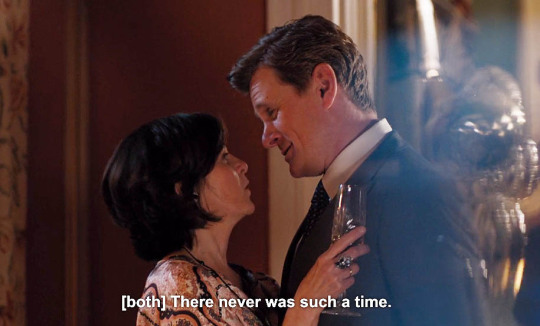
And of course, if the events in S4 only happened inside Sherlock’s head, there literally never was such a time. At least not in the order that the events are presented to us. Some big chunks of this story seems to be missing, while others have switched places with each other in time, making a complete, absurd mess of it all. (And I do believe this is all done intentionally by the screen-writers, to distract the audience from what’s actually going on.) After TSoT the narrative is no longer presented in a comprehensible order. But this would also mean that some apparently absurd things we see in S4 might have actually happened before that, albeit in another, more logical, context. And maybe they weren’t even presented to us that way, right? My point is: some things that appear as non sequiturs in S4 just might make more sense in another time frame. So let’s explore that.
An example of the first case, with important, missing time chunks: We’re not privy to what happened after Sherlock nearly died for the second time in HLV, when his heart stopped after the “Watson domestic scene” in 221B.
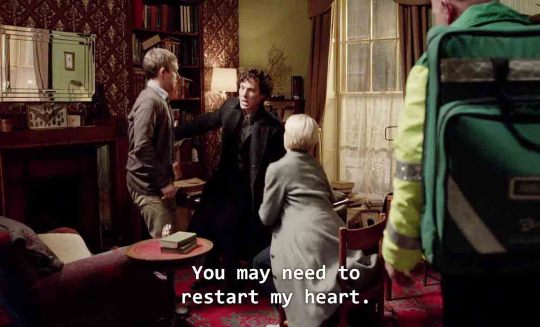
We only see him show up at his parents’ house at Christmas, supposedly after several months of recovery in hospital. As if the dying protagonist’s condition in between these time windows wasn’t even important. And ‘Mary’, who nearly killed Sherlock the first time and then threatened to finish the job, is now invited to celebrate Christmas with Sherlock’s family as if nothing, apparently meant to reconcile with John. But these scenes are mixed up in time with the domestic quarrel and the scenes where Sherlock sets up a trap to reveal ‘Mary’s true intentions to John. This confusion of timelines makes us totally miss the moment when we should have thought “wait a minute - what happened with the murder attempt against the show’s main character?” It was, of course, never logical, as @gosherlocked pointed out in this addition, that Sherlock was now defending ’Mary’s murder attempt, claiming instead that it was life-saving.
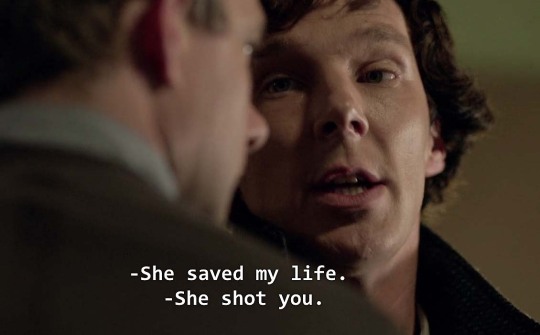
We never get to see how and when Sherlock came to this absurd conclusion, though, we merely see some confusing ‘deductions’ about how a gun-shot can be “surgery” because it’s not a head-shot, or about who must have called the ambulance. These ‘deductions’ have logical errors like causal fallacies and the “slippery slope fallacy”. I once wrote a meta about Sherlock’s lack of logics in HLV and onwards. Something seems to have been blocking his usually brilliant thought process - was it the IV-morphine against the pain in his chest wound? But it had already worn off, hadn’t it?
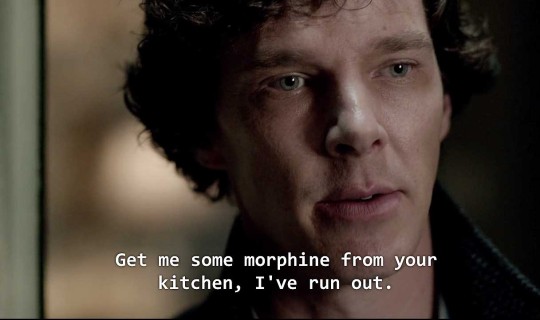
And neither was it logical, I’d say, that John’s wife had suddenly turned into someone like The Spider of TBB; a facade-climbing ninja committing murders in high buildings. Or that a critically wounded and newly operated Sherlock would be capable of climbing out of his hospital window, stealing the wheelchair and IV-drip on his way and setting up a trap for ’Mary’ in another part of town. And, in the mean time, even place a perfume bottle as a hint to John in 221B. Is he Superman or what?
Another example of missing chunks of time is between TLD and TFP, where we never get to know what actually happened after Eurus shot John in the face.
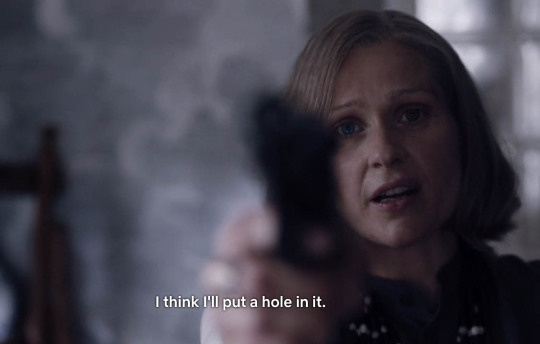
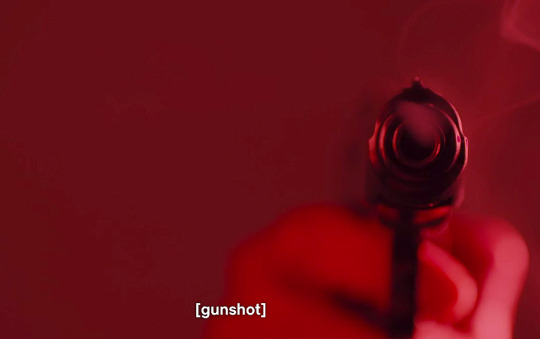
A smoking gun, followed by nothing, and in TFP we then learn that apparently the shooting was just done with a tranquilizer. Why? We’re never told.
And yet another: When did Sherlock manage to get out of his heavy drug abuse in TLD? 221B was turned into a meth lab and Sherlock was so addicted that he had to inject right before talking to the kids in a hospital. His friends had to take turns babysitting him, but apparently he could just snap out of it off-screen? We never got to know how this worked, that part is also missing.
The thing is, from HLV and onwards, neither Sherlock or John seems to have any normal human limitations. They go through fatal situations, where any real person would be bound to either die or be hospitalised, but afterwards they just carry on as if nothing, and any time frame containing real concern about the consequences to their life and health is simply left out.
Time inconsistencies in Sherlock Holmes is nothing new, though; already some of ACD’s canon stories have them (which would be of no surprise, considering that he wrote those stories during several decades, so I imagine it must have been difficult to recall all former events in a perfectly logical order). But ACD’s inconsistencies are minor, I’d say. BBC Sherlock, on the other hand, displays an increasing level of absurdity, at least from TEH.
So - when did it happen?
I think many of us feel pretty convinced that S4 happens inside Sherlock’s head, since this would explain all the logical problems mentioned above. But it’s still difficult to pinpoint exactly when he was actually trapped in there - the “point of no return” - since there are weird elements in this show already from ASiP. That’s why I think we’re seeing the show from Sherlock’s perspective from start; we’re in his head, and whenever it get’s a bit too weird it’s because he’s fantasizing things, reconstructing scenarios on his Mind Stage. This is how Sherlock Holmes’s puzzle solving usually works; it’s his MO. But there’s a difference between Sherlock recalling and dramatizing events in his head - while reading John’s blog - that have actually happened, and Sherlock making stuff up entirely inside his head. Events that aren’t confirmed by anyone else.
In TAB we’re outright told that the Victorian scenes we see were happening inside Sherlock’s Mind Palace:
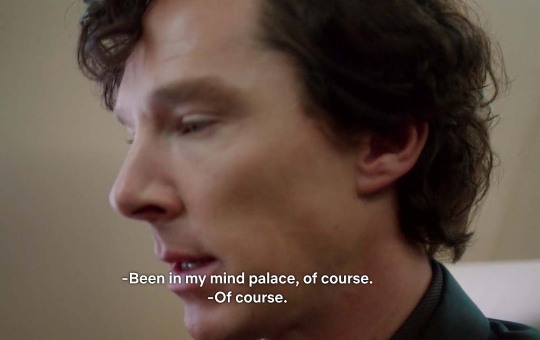
A fantasy, thus. But we’re also told that the Victorian scenes are the product of Sherlock having overdosed on a cocktail of drugs, within the five minutes it took for the plane to take off and then land again:
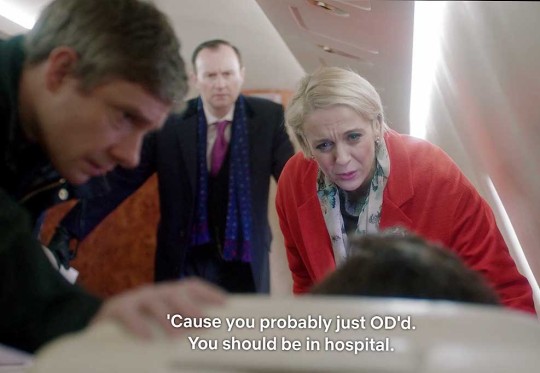
But this time frame doesn’t make sense, as John points out:
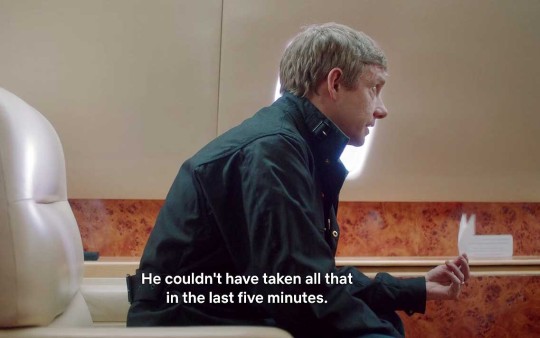
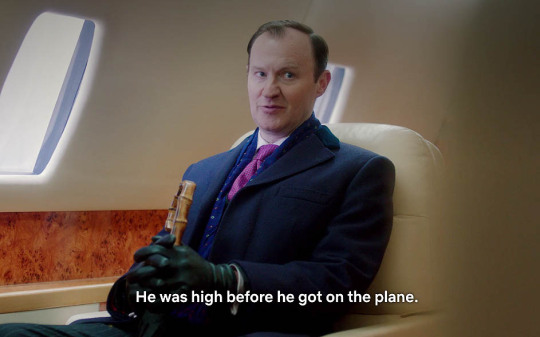
OK Mycroft, fine, but was there even a plane? And if Sherlock was kept imprisoned and isolated before this supposed plane ride, when could he have got the opportunity to take the drugs? As I said in an addition to @the-signs-of-two‘s post, I don’t believe Sherlock’s OD actually happened in TAB, because TAB isn’t ’real’ and never was. It’s all taking place in Sherlock’s head, even the modern scene on the plane above, which is eventually followed by Sherlock, Mycroft and Greg witnessing a skeleton coming to life, and immediately after that scene this:
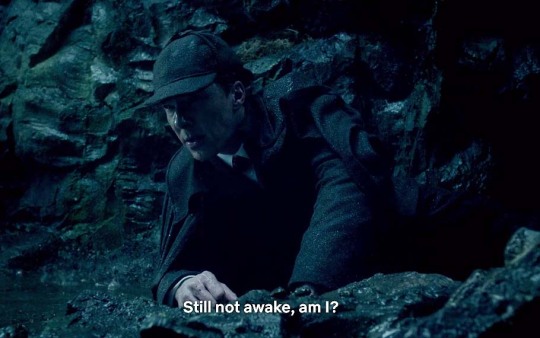
And I also highly doubt there ever was any ’deportation’ of Sherlock to Eastern Europe after having murdered Magnussen, because that scenario is absurd in and off itself. It would be much more likely to be part of a drug-induced dream separated from reality. Just think about it: would Sherlock Holmes shoot someone in the head rather than try to solve the problem? And would he do this to protect someone who had shot and almost killed him? And Mycroft, who is ’constantly worried’ about his brother’s welfare and drug addiction, would he send him off to a certain death rather than prison? No - just no; none of those things makes an iota of sense, and nor have they any similarity to ACD canon.
But knowing that Sherlock is indeed a drug-addict (like in canon) and probably also heart-broken after John’s wedding, I think it’s still likely that he actually did OD at some point. The drugs could well have lead to him being comatose and locked inside his own mind for a much longer time than his usual MP visits. The question is when he did it, though. Because if HLV and TAB are too weird to actually have happened, if they represent Sherlock’s drug-induced dream scenarios, then when did he actually overdose? Well, I think Mycroft has the answer:
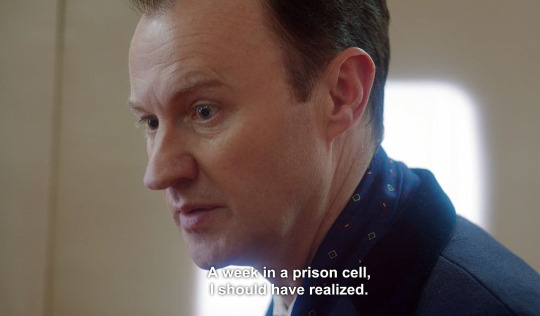
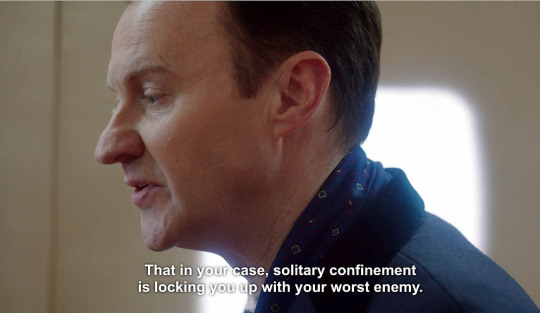
If there never was any week of imprisonment in HLV, because HLV is all Mind Palace, when is this ‘solitary confinement’ most likely to have occurred?
Well, John’s honeymoon is rather likely to have lasted about a week, isn’t it? On the very final comments on the blog we see how desperately lonely Sherlock feels when John is on “sex holiday” with ‘Mary’:
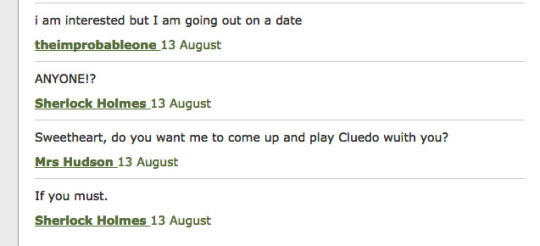
In other words: he’s spending a week of solitary confinement in 221B. A week when Sherlock could have resorted to drug abuse, turning his own flat into a drug den. But this is also pretty much exactly what we see in TLD, isn’t it? When John has stopped visiting or even talking to him, Sherlock is isolating himself in 221B, high as a kite, preparing drugs in the kitchen, reciting Shakespeare, shooting pictures of Culverton Smith and believing he’s walking on the wall:
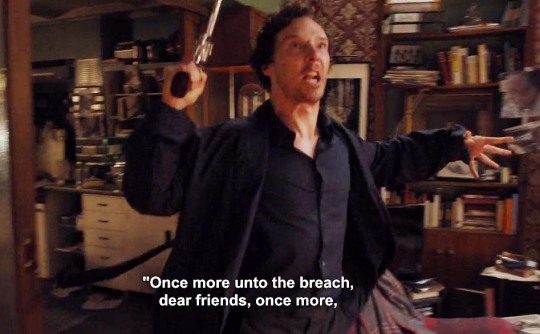
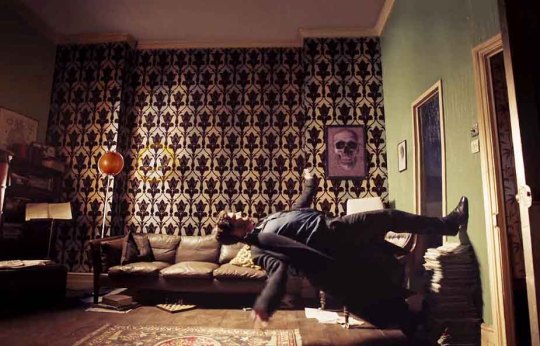
What if similar things to these actually did happen, but in another time frame, right after the wedding, resulting in an overdose? Far more logical and likely than the weird narrative of TLD, in my opinion.
After the wedding in TSoT, the next time we see Sherlock (HLV) John finds him in a drug den - with green tiles like 221B’s kitchen. We learn from Kate, Isaac Whitney’s mother, that this is a place where people “shoot up”. John asks for the exact address, but we never get to know it... And even if Sherlock claims that he’s there for a case (Magnussen), later in 221B he admits that he is indeed high.
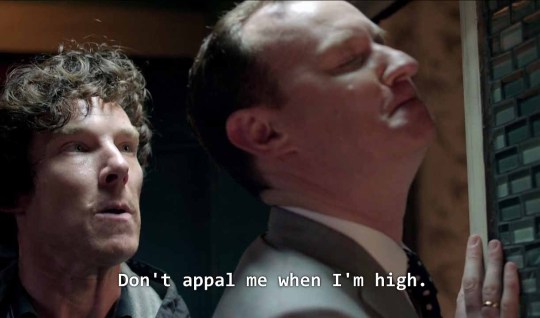
But the main reason I believe that the OD happened right after the wedding is that this was exactly when John’s blog stopped updating. Since the blog is an external factor, written by John, it simply can’t be reflecting Sherlock’s version of the events. Until he hacks it and takes over the blog after the wedding. I think this symbolizes that Sherlock has now completely taken over the narrative (which is also manifested in S4, with John typing things on a jpg file in TST which we never see published, and people believing it’s Sherlock’s blog in TLD).
Up to this point, the narrative has been - broadly speaking - consistent with John’s version on the blog. But then Sherlock takes over and the blog stops updating. Which might mean that John is having far more pressing issues on his mind than writing on his blog - the issue of waiting by a comatose Sherlock’s hospital bed.
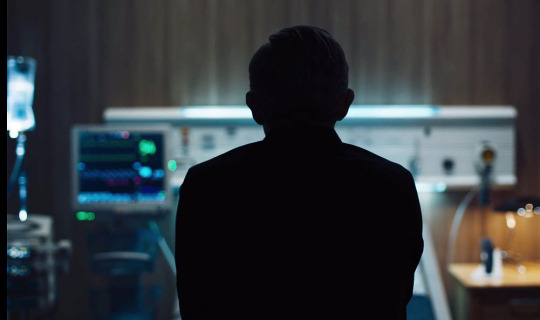
In the mean time, the weirdness takes absurd proportions, because the story is no longer reflecting ’real’ events described by the blog. The ’new’ things that happen are rather parts of drug-induced dream scenarios after Sherlock’s OD I believe, as literally shown in TAB. I think these dream scenarios are made up by a mix of re-cycled elements from Sherlock’s own memories of actual events, mostly from his adult life in episode 1-8, and Sherlock’s imagination of places where he’s never been. But I also believe that the ’real’ Sherlock is hospitalized and comatose after his OD, which sometimes bleeds through in HLV, TAB and S4. So the number one thing I expect to see happen in S5 is Sherlock finally waking up to reality instead of being trapped in his own variant of Dystopia; a reality where he finally gets the opportunity to face the truth about him and John.
Tagging some people who might be interested: @the-signs-of-two @sarahthecoat @ebaeschnbliah @sagestreet @raggedyblue @gosherlocked @elldotsee @spenglernot @loveismyrevolution
322 notes
·
View notes
Text
The Textual Failure
I’ve seen a lot of people’s complaints being invalidated today on the faulty logic that the only reason people are unsatisfied with this episode and season is because of the lack of explicit confirmation of a ship. If you honestly believe that, please continue reading - because, completely divorced from any subtext, this was a mess for every character around.
It was just bad writing:
1.) Eurus & Sherlock
If the intention all along (which from today’s interview bits I’ve see from Moffat is the case) was to explore what it would be like if Sherlock had a sister, this execution fails on every level. Sherlock is our main protagonist, so by the nature of good storytelling, all other characters and their actions should either be an impetus for him to change. Eurus shows up as a “emotional” character 10 minutes before the end of Season 4, and will not have any future impact on his story.
If this was the intention from the beginning, Eurus should have been textually involved a long time ago. Why would I now, after 12 episodes and 7 years without her, suddenly care about her? Why, after all this time, would I think it was genius writing to shove in, in the very last episode, that the only reason he is the way he is is because he forgot his dog/friend died 30+ years ago, and forgot his sister somehow.
Imagine, for a second, that at the end of Deathly Hallows, Dumbledore tells Harry that he has a twin sister who is locked away in a tower that he completely forgot about, but he’s only who he is because of her, and his emotional arc will only be complete after she tries to kill him, Ron, and Hermione, and then he forgives her and hugs her. You would probably say “Hey! But Ron and Hermione are the point - they’ve been there all along, they’re the ones who matter to Harry and his arc!” So why is this any different?
It is bad storytelling.
2.) John
Oh, John. Out of all the characters that got decimated this season, John really got the brunt of it. Again, not even paying attention to the subtext, on a purely surface level, Culverton was completely right to laugh in his face during TLD:
John, the doctor, was driving the car, while Sherlock, not a doctor, was in the back seat with the woman who was giving birth.
John, the doctor, does literally nothing when Mary is shot.
John, the doctor, doesn’t care that his best friend is pronounced weeks away from death, and doesn’t even seem to find this to be alarming whatsoever.
John, the doctor, kicks said dying man while he’s down, to the point he is coughing up blood.
John, the doctor, doesn’t know the difference between dog bones and child bones.
On an emotional level, John has absolutely no coherent arc. In chronological order this season:
Has fun solving cases with Sherlock and a pregnant Mary.
Becomes a father. I think he likes it? Who knows.
Starts texting Fake Bus Girl.
Keeps texting Fake Bus Girl.
His wife runs away, and when he sees her again he says he used to like her. Textually, is pissed and unsatisfied with their lack of communication.
One day later, she dies saving his friend, and he blames his friend.
He drinks a lot, hallucinates his dead wife, and is still hardcore blaming Sherlock for everything.
He doesn’t care that Sherlock is dying, and then beats him extremely harshly.
He leaves Sherlock in the hospital, and leaves his cane - I guess as a final “fuck you!”.
He sees that Mary told Sherlock to “go to hell”, and only then does he care that Sherlock might die.
He gets irrationally angry at Sherlock receiving a ‘Happy Birthday’ text message.
He says he’s only a good person because of Mary, and wouldn’t have saved Sherlock any other way.
He then confesses his text affair to Sherlock and Invisible Mary, and literally says that he wanted more out of it, and he still does.
So tell me, what is his arc? What is his motivation for anything? I don’t see a common thread anywhere - he loved Mary, but he texted this chick, then he didn’t like Mary enough to say it straight to her face, then Mary died a day later and she was the love of his life, and then he wishes he’d gone further with Fake Bus Girl; Sherlock is his best friend, his best man, the Godfather to his kid, but who cares if he’s dying, it’s totally his fault that Mary died, let me kick him in the stomach until he bleeds, let me never see him again, oh Mary said he’ll probably die maybe I should care now, oh now we’re in a bunker and he’s going to shoot himself in the head no biggie. ????????
It’s actually embarrassing.
3.) Mycroft
Aside from how he was able to lock his little sister away on a high-security island without their parent’s knowledge, why would he do this? There is literally no logical motivation for this. And beyond that, what was the point of him having Moriarty go to the island? What was the point of any of that stuff with Lady Smallwood? Why did he do any of this - what was the point???
4.) Molly
I’ve seen quite a few “Shove your fake feminist concern about the ‘I Love You’ scene up your asses, it was a wonderful scene for Sher/olly” posts - a lot of them, actually. And honestly, whatever - if you think that was a beautiful scene, that’s your right. But as I said, I’m not interested in subtext here, and all the text shows is:
Eurus setting this up to make both Sherlock and Molly feel horrible, and that is what is shown to us. Molly has always been used as a ‘human’ reaction to Sherlock’s ‘inhumane’ harshness, and we see the same character beat for her again here. Like all of the characters this season, it is just...disappointing to watch, when seeing Molly progress as an independent character would have been so interesting. Same shit, different day.
5.) Mary
I have seen equally as many “You are a horrible feminist if you don’t like Mary” posts, and again, no. I love villains - honestly, antiheroes are BY FAR my favorite type of character. From the Hannibal Lector (NBC Hannibal), to Spike (BtVS), hell, even Blair Waldorf (Gossip Girl) - characters that are really terrible people, in one way or another, but through their progression become something more complex than they were to begin with.
Mary did not do this. We meet her as the benign and snarky fiancé, then she is revealed to be an assassin when she literally kills Sherlock, and threatens to kill him yet again the that empty house. The very next time we see her after this entire ordeal, John forgives her in front of the fireplace - and that’s it. After that, she’s Rosie’s mom, she says John was “her whole world”, and then she dies. And then she sends a couple videos to narrate the next two episodes. The end.
So where was the character progression? Where was the evolution from “fiancé” to “ruthless assassin” to “devoted wife and mother”? Where was her guilt, her feeling torn between being a mother and being “free” and on the run, where did she (or John, for that matter) ever show true emotional connection before that death scene, where was her personality (beyond being quippy)? They skipped the entire middle part of her story, and just expected everyone to go along with it without suspicion or complaint - well, here I am, complaining.
I wanted so much more, because I wanted to believe that they wouldn’t just flatten her character out into a pancake - but I was wrong.
6.) The Point
What was the point? Truly, was there one? That lesson that so many great shows impart: the idea of found family, the wonderful steadiness of gaining trust, the overcoming of circumstances, knowing that someone will catch you when you fall.
The lesson here seems to be: don’t pay attention to the details, your childhood trauma created you, you can’t trust your best friend, if you are dying your friend will only save you if he happens to hear his dead wife tell him to, you can’t trust your family to tell you the truth, all you are is that one character trait, but that’s not important anyways - this is just a detective story, and your emotional arc isn’t important.
So why are we watching the show? I can read the stories - and I have. The point of the show should have been the characters. But it wasn’t, and that is the most disappointing thing to unearth after all this time.
It is what it is. And what it is is shit.
28 notes
·
View notes
Text
Harry the Secret Twin
Something struck me today, while looking for some quite different things. We do know that John ‘I’m-not-actually-gay’ Watson has a gay sister called Harry (short for Harriet), right? We actually learned this pretty soon, in the very first Sherlock episode. But they never told us if Harry is John’s big sister or little sister. Or maybe there’s a third alternative...
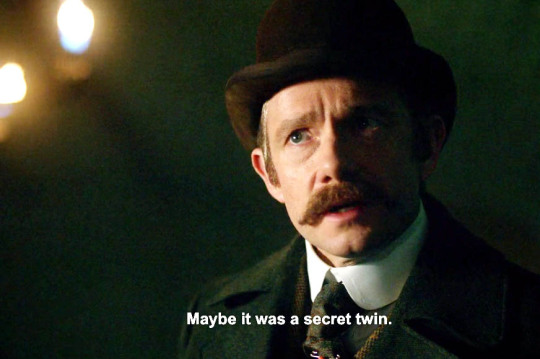
So, when I was reading these old comments on Ariane DeVere’s transcript sites from 2012, discussing the fact that John reminds Harry in his blog comments that she is 36 years in January, while John is referred to as 37 years in the papers six months later, I realized that yes; if these facts are correct and they both turned 37 in the first half of that year, twins could definitely be an option.
John and Harry might be twins, both in a literal and a symbolical sense.
The thing is, we have never seen Harry. Or actually, it seems like we’ve never been allowed to see Harry. She’s referred to repeatedly in the show - at least up until TSoT - but we never get to meet her; John’s own sister doesn’t even show up at his wedding! But from HLV and onwards, Harry Watson is never more even mentioned. For all we know, she’s a ‘secret twin’. In fact, there’s not a single gay or bisexual person mentioned ever again after TSoT, except for those who are presented as extremely dangerous people (Jim, Eurus and Irene). While up until TSoT, there were several others, apart from Harry:
• Mrs Turner’s ‘married ones’ in ASiP
• Kenny Prince and Raoul in TGG
• Kate (Irene’s GF) and ‘Your Highness’ in ASiB
• Beppo and Pietro in The Six Thatchers (as described on John’s blog)
• Gary and Billy from The Cross Keys in THoB
• Sabrina in John’s blog post “Happily Ever After”, who I think we also see un-named in Sherlock’s speech in TSoT:
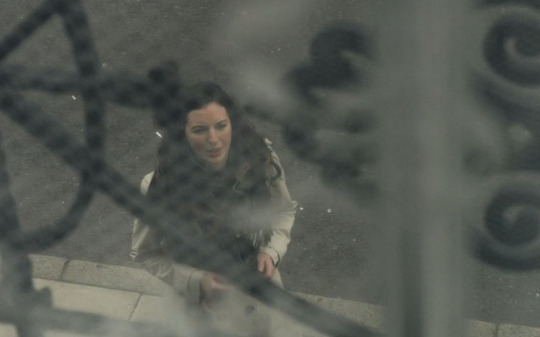
I never felt there was a ‘fair’ representation of LGBTQ people in the show, and these characters are either presented as involved in 'suspicious’ activities (e.g. Raoul, Gary and Billy) or pushed aside to peripheral corners of the show (e.g. the ‘married ones’, Sabrina) up until TSoT. But after this, they’re not even referred to. So I think what we see is an increasing level of heteronormativity from the introduction of ‘Mary’ and onwards. Which I think is also shown by the treatment of John’s and Sherlock’s relationship, which was discussed in the additions to the ‘Heimish test’ some time ago. And, of course, we were actually brought back in time, all the way to 1895, weren’t we?
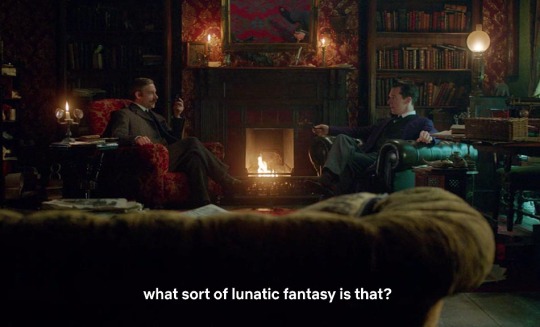
And TAB, no matter how beautiful the setting, is impregnated with old-fashioned sexism, where Mrs Hudson is reduced to a plot device, Mary is supposed to have dinner ready when Watson and Holmes come home, ‘Hooper’ is next to ‘outed’ as a woman who is trying to ‘get ahead in a man’s world’ and Watson’s house maid is berated for being observant. And John Watson seems paranoid about a whole bunch of people with supposedly too radical opinions (socialists, suffragettes, serbians etc.).
And even as the double decker makes its way through Baker Street, after this we never see any actual transition to modern times, when Sherlock wakes up to them, do we? Even as the environment shifts, we’re stuck in the values of 1895.
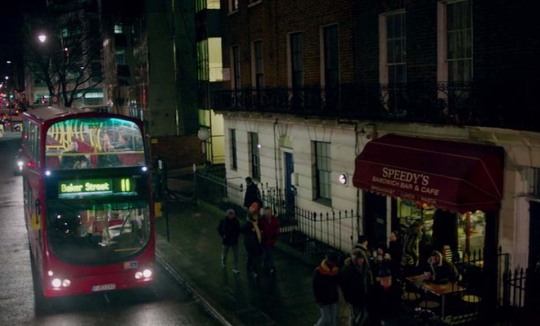
Is this deliberate? Oh, yes, I think it definitely is; I believe the increasing heteronormativity and references to reactionary views are meant to provoke anyone attentive/interested enough to see it; it’s a worst case, dystopian, nightmarish scenario displayed in front of us, and I don’t think it will break until the protagonists (read Sherlock) realizes this. Until Sherlock wakes up from his coma, and the 120+ years old character can finally start to live...
So, what about Harry?
I think Harry’s absence is a part of this dystopia; she’s a secret twin, she isn’t allowed to come forth! That’s why we never get to see her. The only place where Harry seems to be ‘alive and kickin’ is on John’s blog (which has been silent since TSoT). I made a little research of her blog comments, to get a more complete picture of her. Harry has made a total of 47 blog comments. Basically, this is what I’ve found out:
- Harry’s love life isn’t going very well, as it seems; she’s divorced from Clara and no one else is ever mentioned.
- She seems incredulous to the idea that John would either be a ‘casanova’ or ‘gay’. Harry is curious about what’s going on with Sherlock, though, and seeks contact with John about it. She seems to pick up on their attraction to each other rather quickly.

- Harry has a problem with alcohol and a tendency to spout profanities in the comment section of John’s blog, especially in response to arrogant people. You can tell by her occasional grave misspellings when she’s inebriated. John doesn’t seem to want to have much contact with Harry, but he does try to help her whenever she has a crisis from the liquor.
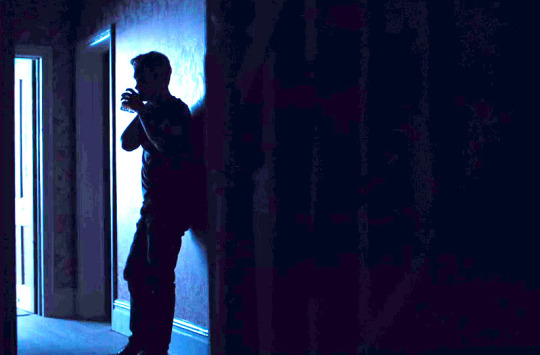
- She’s passionate about many things and seems to easily flare up. When John is attacked by haters on his blog after Sherlock’s death, Harry defends him furiously (so furiously, apparently, that John deletes her comments).
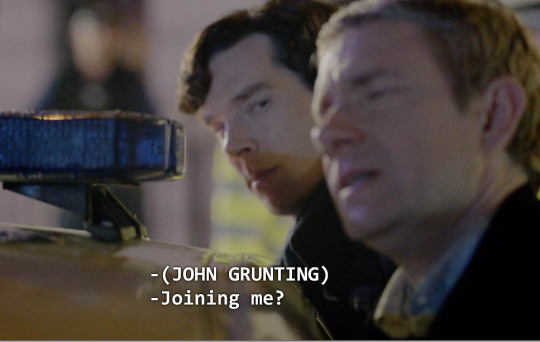
- At the same time as John splits up with Sarah, Harry seems to be staying off the alcohol rather well. 3 months later, however, by the time John and Sherlock are described as ‘confirmed bachelors’ in the press, she’s on the booze again.
- A year later, after Sherlock’s ‘death’, at the same time as ‘Mary’ shows up on the blog, Harry seems aware of her drinking problem.
- When the friends gathered to celebrate John’s birthday (this is talked about in the MHR blogpost as well as in the show’s MHR), Harry was there too (which doesn’t exclude the possibility that it was her birthday too). But Sherlock was not there. Which means Sherlock might not ever have met Harry.
- After Sherlock’s return, when John announces that he’s getting married, Harry is back on alcohol. By the time the wedding approaches, she no longer comments much on the blog. But when John supports the ‘Mayfly Man’s methods, she chimes in with ‘Mary’s indignation.
So - can we discern a pattern here? Oh yes, I think we can. For some reason, Harry’s alcohol problems seem to be synchronized with John’s relationships with women. And if I’ve smuggled in a couple of pictures of John above, it’s because I think many of Harry’s traits/problems are visible in her (twin) brother as well: loneliness, alcoholism, hot temper... If you have read @sagestreet‘s meta series ‘Follow the dogs” (I can highly recommend it) you might remember his theories about John’s bisexuality in Part 5, represented for example in TGG by Connie Prince (his heterosexual side) and Kenny Prince (his homosexual side).
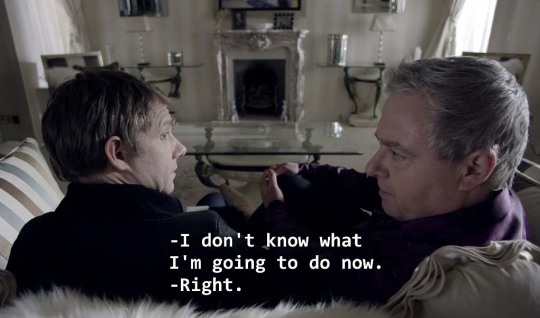
Or in Part 2 about THoB, represented by the fisherman (homo side) and his mother (hetero side). I honestly think these mirrors/metaphors can be applied to John and Harry as well.
So, my point here is the following:
I believe the reason why we never get to see Harry is because she is a metaphor for the gay part of John’s bisexuality, which he constantly tries to hide and repress. Sherlock hasn’t met Harry because John has never openly shown this side of himself to Sherlock. John mentions her very rarely, because he is closeted and doesn’t want to recognize that he has a side with same-sex attraction. Harry has alcohol problems because John tries to dumb down his physical longing for Sherlock with alcohol (in @sagestreet‘s analysis, John’s homo side is starved, even if it’s actually more prominent than his hetero side).
If I could make a wish for S5 (except for Johnlock, which I actually take for granted) it would be that they finally let us meet Harry. :)
Tagging some people who might be interested: @raggedyblue @ebaeschnbliah @gosherlocked @loveismyrevolution @sagestreet @sarahthecoat @tjlcisthenewsexy @elldotsee @csi-baker-street-babes
169 notes
·
View notes
Text
The Deconstruction of John Watson
I've been thinking about the John characterization in Hubblegleeflower's post-S3 fic 'In the Dark Hours', in the context of S4 and specifically The Lying Detective. It really seems on-point, even prescient. I was also thinking about what Ivy said about John's inherent violence, how "when John is bad, he is terrible", and how disappointed in himself he was in TLD. The fic makes me think about what John must have wondered about himself *before* Mary's idealization to have the dissonance hit him *so* hard, that he'd have to punish himself and Sherlock and lash out so extremely. In the fic, a younger John sounds like shades of Sherlock-- wondering if there something 'wrong' with him for being addicted to danger, for getting off on the rush, enjoying these things to make himself feel alive. That tendency to say and act the right way in order to 'seem normal'-- he actually has that in common with Sherlock, except that (of course) John is much better at it.
On the other hand, I agree with John's own conclusion in the fic and with Ivy that John is actually not 'like that'. He's definitely not like Mary (as per all those endless debates post-HLV); he *is* a good moral compass after all *because* "he knows exactly what it means to be pointed the wrong way". At the same time, the fact that he'd wondered about himself seems realistic. Seems *likely*, even. If Sherlock is someone who has tried-- and ultimately failed-- to make himself into a high-functioning sociopath after Eurus, as I wrote recently, John is coming at his persona from the other direction. Trying to be *normal*, trying to do good, trying to be someone he thinks-- he knows-- he's not.
A lot of people depended on John to be Series 1 John even after Series 3, essentially, even though Sherlock told us in HLV that John is addicted to a 'certain lifestyle' and 'abnormally attracted to dangerous situations and people'. John is not surprised, he just says *Mary* wasn't supposed to be 'like that'; he's not happy about his attraction to all these things but he was *aware* of it, and he wanted to get away from it. It seems to be that instead of an arc, what we have here is a sort of deconstruction. We started out with John and Sherlock in opposite corners in Series 1, and they're in opposite corners again in Series 4, except they're the flipside of each other. Sherlock is the 'good man' even though he'd shot someone to protect someone else, and John... John is a bit 'not good', but he has a heart. He's still human. On the abstract level as well as implicitly, being truly established partners in TFP, they've met in the middle.
I know I've said yesterday that my problem is that Sherlock's arc encompasses and sort of *consumes* John's role, with John not really being able to match Sherlock's growth due to being the deuteragonist. I agree with @plaidadder's comment on @ravenmorganleigh's post, about the growing fannish consensus that "John and Sherlock's emotional arcs are no longer intertwined" in Series 4. I do still disagree that this means Sherlock's growth in Series 4 is somehow more about Eurus and Mycroft (and Mary!) instead. Certainly (but more subtly), John's arc also didn't suddenly become about Mary either, if nothing else then because everything (but everything!) in this show has always been about Sherlock. Although this means Mary's not the *point* in TLD, in many ways it also means that unfortunately, John is not the point either. I do agree with the analysis in that the plot of TLD is essentially *all* orchestrated by Sherlock (including John's beating, which was demonstrably part of Sherlock's plan to stop Smith). The only bits Sherlock didn't predict were to do with Eurus, and more broadly the fact that Mary was shown to be wrong, because she didn't know John the way Sherlock did. As I said, and I cannot emphasize this enough, this is because everything is about Sherlock.
I think lot of this confusion has to do with a misreading of Mary, and Sherlock and John's relationship to her, or a sort of... overcompensation, I think. Like, a lot of us thought (or rather, hoped) that it's all going to go to hell after S3, in a way that would justify the fandom's suspicion and dislike of Mary as well as the fandom's resistance to the surface reading of HLV. In other words, she's going to pay, somehow. We were so deeply polarized by HLV, with such a long and bitter fandom divide forming on Mary, that virtually no one actually took the time to synthesize a Mary characterization that actually *included* the facets of devoted (but unfortunately unsuitable and unhappily married) wife and the cold assassin. People were *so* certain that either she *couldn't* have shot Sherlock if she truly cared about John, or the whole attempted murder thing was genuinely nothing, simply 'surgery' as Sherlock claimed, because what's a little murder between friends? Neither option made sense by itself. And so, Series 4 broadly made no sense to people (without really extreme rationalization) because the answer was always 'both', and TST went as hard in the direction of sacrifice as HLV went for armed assault and implied threats. There was no bridge, and so a lot of connections were just never made, it seems.
I'll admit that HLV set things up in a way that was (in retrospect) difficult to fix, and I agree with the other point that S4's characterization issues started in HLV. I just don't think that Sherlock's acceptance and forgiveness as well as John's intense anger (and projected guilt) at Sherlock about Mary are meant to whitewash absolutely everything about Mary's behavior, *including* things like her abandonment and drugging Sherlock in TST. As TAB showed clearly, Sherlock has *issues*; he has severe self-esteem issues in terms of relationships, and specifically in regards to John. Obviously, we can't just take him at face value when he says Mary's actions 'conferred a value' upon his life; I don't know, I think it's obvious that this isn't rational or somehow deserved. Anyway, the kindest interpretation is that she *shot* him but wanted to atone, to do better, to do the right thing in the only way she could. Otherwise, this is about Sherlock and John and their existing issues, although the narrative simply focuses on Sherlock's agency... to a fault, really.
It's true (I think) that Sherlock genuinely tried to include Mary because he liked her, and I even think Mary honestly did like him (though of course that didn't mean she wouldn't shoot him), but it was always about John. As Ivy said, John is the central figure in both their lives, so both of them have had to accommodate the presence of the other. They've *both* done that. I know it requires a certain kindness to Mary to accept this, which may not come naturally, but I think you really cannot parse John or Sherlock's motivations anymore at this point without accepting that point. To say that Mary (or Mycroft) *replaced* John's place in Sherlock's narrative is going much too far, although I do think Eurus did take over and expand on *Moriarty's* place as Sherlock's Shadow and antagonist. Anyway, the problem is indeed that Sherlock and John's arcs are clearly not intertwined in Series 4, which is why John doesn't get a full, explicitly shown climax. But this is because as I've said, John lacks an arc (as deuteragonist), not because it's now remade in Mary's image. If he had an arc with Mary, we'd see an actual resolution *through* Mary; instead, Sherlock’s actions and reactions make the difference. That is not to say Mary (and Irene, and Eurus) haven't mediated and acted as conduits for both characters' development. Of course, I still agree with @delurkingdetective's response to Raven's post. I just think there's a big difference between a conduit and a focal point. Mary may be a *motivation* for John or Sherlock's actions, but that doesn't mean she's the underlying *reason*. It's one thing to critique the show for using women as conduits, or Moffat and Gatiss for being too conservative to write this arc between two men explicitly. It's another thing to mistake a conduit for a character of true importance, a character whose agency truly makes a difference rather an *obstacle*, even if it's not about Mary or Irene being *romantic* obstacles. They are definitely still treated by the narrative as something for the male protagonist to deal with and ultimately defuse or overcome.
Unfortunately, although I'd like to use the Mary of 'In the Dark Hours' for insight, the fact is that she is something like a dark conduit herself, a presence mainly felt through her absence from John's life. In that sense, she is similar to S4 Mary, although I suppose most readers would say it's very different because this fic's version is clearly an emotionally abusive character who's *labeled* so. The truth is, of course, Mary is just as problematic in Series 4 as ever, and John's relationship to her never improved while she lived (and in fact, he cheated on her, just as he did in the fic, although it was always indirectly). It's more satisfying to see Mary labeled and understood as abusive, but at the same time... I don't know if it's realistic. More importantly, I think this is the flaw of focusing so entirely on Sherlock, and avoiding a truly joint arc and/or canon Johnlock. If Mary *was* abusive, John would need an independent arc to deal with it; more realistically, Mary would have to actually stay longer on the show. In the fic, Sherlock tried to heal him emotionally just as he tries in TLD, except this goes a lot deeper, and they talk a lot more (and it involves touching, claiming, binding John to himself). Not that I'd ever need or expect the show to go there, but my point is that Mary's impact *couldn't* be too deep because then you couldn't hand-wave it by Mary simply giving her blessings by TFP. In Series 4, John's issues are more about his self-image, his conception of himself as a moral man, as someone who's capable of being his 'best self'. Sherlock doesn't *clearly* say it's John who makes him better, but Mycroft already said it as far back as ASiP. It's obvious. It's also obvious that it's *Sherlock* who makes John better and he always had. John is just doubting that; doubting himself, doubting Sherlock. He's ashamed, lost, angry at himself, wishing he could have been the kind of man who Mary had envisioned (even though he's already the right man for *Sherlock* and is exactly what Sherlock needs-- as he implicitly recognizes by TFP). I just think the show expects us to know that implicitly, to understand that without spending the time to spell it out... and they also use female characters as tools to communicate all this, unfortunately. It doesn't quite... work.
Anyway, the John of 'In the Dark Hours' struggles very much with that sense of shame, with all the guilt issues. Even if TLD John had somewhat different motivations for it, I still think it's a source of ongoing fracture for John, and it seems critical to all his worst, most violent and stonewalling behavior in the show. Remember in HLV, John exploded into violence (frightening Mrs Hudson) when he assumed Sherlock was implying Mary was his *fault*. He clearly has a severe reaction to that idea, a violent reaction, and specifically with Mary, with his choices. He thinks everything is always his *fault*, and then, of course, he also thinks Sherlock is brilliant, superhuman, can do anything. Could have saved Mary if he wanted; he promised. So, that was Sherlock's fault. An excuse, as Martin Freeman said. An excuse to let all the anger out, to succumb, to dissociate. And Mary's hallucination is a sign of dissociating, isn't it? Not that she's literally a split personality like with Eurus, of course, but she's always saying the things John thinks but can't or won't say: monster. Posh boy. One of reasons I do think John has progressed in S4 ('cause even if it's not a full arc, neither is it a *retread*, in other words), is because of this new insight into John. Series 3 was about Sherlock's Dark Night of the Soul, and John's S4 version is a bit condensed: sparked by Mary and mediated by Sherlock. We see John's darkest corners, but in the end they are simply accepted and integrated because they always have been, by Sherlock. With Sherlock, John is always safe. With Sherlock, John is contained, and even his worst violence is both expected and accounted for.
I think I just continue to struggle with the execution, in part because of the differences between written work and film, as well as issues of genre. 'In the Dark Hours' is a supremely internally focused fic, in a way that the show could never be. Everything had *always* been mediated by metaphor and external action on the show, from the very beginning. Women were used as the markers and conduits since the start-- not just Irene in ASiB, but Soo Lin Yao in TBB, who's a really blatant Sherlock mirror. Perhaps... as much as I wish we could have continued on track with TLD, and as much as I accept the many valid critiques of the execution and Moffat and Gatiss's self-indulgence and narrative conservativism in Series 4, this is what fanfic is for, in the end. These conversations.
#sherlock meta#john watson things#johnlock recs#sherlock feels#johnlock feels#mary morstan#series 4#hlv feels#the six thatchers#his last vow#the lying detective#fanfic meta#characterization#sherlock's arc#narrative#the great divergence#sherlock spoilers
44 notes
·
View notes
Text
Eurus and Mycroft's Gambit in TFP
I was thinking of the recent @thepurplecarbuncle post about what Mycroft told Sherlock at Baker Street in TFP: "the man you are today is your memory of Eurus". I agree with her incredulous response, in that I can see how it sounds false, like a pure retcon-- it sounds ridiculous-- because it *is* ridiculous and it's meant to be, on one level. Obviously, if it's taken to be literally about Sherlock's deepest self, his best self, that can't be true. Sherlock is a kind man, a 'good man', as Lestrade says later in the same episode. So it's textually not *literally* true. But at the same time, Sherlock's not *only* that man that he'd become thanks in part to John Watson, is he? As Ivy told me so eloquently, the whole point, whether here or in Mary's reference to who Sherlock and John 'really are', is about the *duality* in Sherlock and John's natures.
Sherlock is kind and good, but that hasn't always been the persona he's been inhabiting, is it? Him standing with Moriarty on that rooftop, promising Moriarty that he's not one of 'the angels' wasn't all that long ago, and Sherlock had shot Magnussen while proclaiming himself to be a 'high-functioning sociopath' just recently. And that persona, including Mycroft's spiel in ASiB about heartbreak being inevitable and how 'caring is not an advantage', had always seemed to be tied to Mycroft and his influence. Still, you can't just take Mycroft at face value, 'cause he's playing the role he's always played. If anything, he's more obvious about it in TFP than ever before, explicitly taunting John to Sherlock's face 'cause he knows Sherlock would always choose John-- would always choose *sentiment*-- and he wants to make it easier on Sherlock. As usual, Mycroft tests and prods both John and Sherlock at Baker Street, rather than being straightforward. Mycroft certainly isn't simply saying that Sherlock is some kind of Eurus lite(tm), and he always has been his whole adult life. He'd just called Sherlock a 'dragon slayer' in HLV; he *knows* Sherlock for real. The point is that he *hasn't* been like Eurus, but Sherlock's made some deeply unnatural and unnecessary choices to shut himself off from friendship and emotional intimacy because of trauma from events related to Eurus he cannot remember. Of course... that's not established text, at least until TFP. We just have clues and foreshadowing. In TAB, Sherlock insists 'I made me' (although he then thinks of Redbeard when there's a dog barking in his Mind Palace). And indeed, Sherlock's choices in response to Eurus-- at the beginning and the end, in TFP-- are shown to be very much his own. He certainly made himself what he is by *choice*, even if he's not conscious of it afterwards.
The Final Problem has various callbacks and parallels (the big one to THoB, for example, that I've discussed recently). Besides the differences in the vector (Sherlock's own mind rather than a hallucinogenic drug with Henry), I think it's important to note that Sherlock *chose* to forget in a way Henry didn't. Sherlock isn't just a victim of a crime, but still the active protagonist. His conversation with Mycroft at Baker Street can also be a callback to ASiP. That's where we first heard Mycroft say John could be the 'making of' his brother, 'or make him worse than ever'. As Ivy summarized, TFP works as the resolution of Sherlock's arc, and so we had to answer the question of why does Sherlock actually say he's a 'high-functioning sociopath'? Why does he say being alone 'protects' him? When people dismiss the entirety of TFP, it's easy to miss the issues of characterization continuity and the sense in which things may actually make sense in unexpected ways.
I should emphasize that I don't think Sherlock's trauma is meant to be definitive to his personality. The question of whether Mofftiss always intended this reveal since Series 1 is interesting but ultimately irrelevant in practice. It's enough to say that Sherlock's always worn part of his 'Sherlock Holmes' persona, the 'high-functioning sociopath' self, as armor. It's never been natural. It's not because he's naturally a misanthropic loner (like Mycroft), who thinks of other humans like goldfish. This doesn't mean that he's *not* different in his own way, or that he didn't mean it when he told Mycroft in TEH 'why would anyone mind?' But unfortunately, Sherlock struggles to fully accept or accommodate his own humanity even after TEH (though the process has begun at that point). In HLV, he regressed from his touching, emotionally open wedding speech to tell John that romantic love was 'human error', and in TAB he actually cries, overcome when Watson acknowledged his humanity. John has had a tendency to believe Sherlock could work miracles-- in TRF, he wanted him to not be dead as 'one more miracle'-- which had long been an ongoing issue, as @stephisanerd described in her classic meta. So it's more like this childhood trauma is just the specific trigger to what was always an ill-fitting illusion of all-knowing supremacy that Sherlock put on as a defense mechanism. And *that* is Eurus's fault (indirectly, at least); essentially, Eurus herself is the DFP personality with nothing underneath, in a much more personal, less metaphorical way than Moriarty had been. If Moriarty is the 'virus in the data' in TAB, Sherlock's response to Eurus had corrupted his operating system in this metaphor.
Whether Eurus was intended from the start or not, I essentially think she is simply the mechanism. It was always pretty clear that Sherlock was carrying around some pretty toxic ideas about what kind of things he should aspire to for himself. There were some unrealistic standards he held himself to, but he also has some extreme convictions about sentiment and 'romantic entanglement' leading only to heartbreak. In a sense, we'd always blamed a sibling for this: we'd just blamed *Mycroft*. Mycroft said lots of insensitive things and provided a sense that Sherlock's family life was cold, or at least complicated (especially pre-S3). Then we met the Holmes parents, and it seemed like Mycroft and Sherlock were actually a product of a 'normal', happy home... if one with a math genius mother. But Mycroft's clear resentment at Christmas (and his 'file' of complaints about his parents) and Sherlock's avoidance and awkwardness still seemed... a bit odd. Clearly, some kind of issues were not being addressed. A lot of issues, as it turned out, although in some ways the Holmeses really were a supportive, even ordinary family. The parents just really didn't know what to do with Mycroft and Sherlock, let alone a girl like Eurus, it appears.
I think it's clear that Mycroft always felt he had to take care of things invisibly, to be 'the adult' (even if Mummy didn't appreciate it in the end: another statement there's no need to simply accept at face value). He couldn't just tell Sherlock that he thought he wasn't dealing with the issue properly; if anything, sentiment really isn't Mycroft's area, as he said in TEH. But he worries about Sherlock... 'constantly', as he told John from the start. Mycroft has always placed a lot of stock on other people's potential influence on his little brother. He's seen how sensitive he is; how deeply he can be hurt. So of course, if he thought John Watson could be 'the making of' Sherlock after 24 hours, he's the type to blame Eurus's bad influence for Sherlock's unfortunate conviction he was a 'high-functioning sociopath' (a descriptor he'd be most likely to have heard applied to Eurus, not himself). Mycroft's gambit in ASiP was that John could break through to him, somehow, though this didn't mean he'd start suggesting Sherlock open his heart anytime soon. Both brothers had been burned, and Mycroft was very, *very* protective (after Eurus came the drugs, after all). Mycroft always knew how much both John and Sherlock resisted and doubted him and anything he said, so he *couldn't* be straightforward even if he wanted to. It's true that even at the wedding, Mycroft still warned Sherlock not to 'get involved'. It's not that he meant the opposite, necessarily-- but he really does worry about Sherlock and his tendency to have 'danger nights', after all, and this wasn't baseless, as HLV demonstrated. However, surely Mycroft still believed John to have been a good influence. Even if both of them admired Eurus a little too much, surely Mycroft knew Sherlock would need to choose John, and could be counted on to choose John in TSoT.
In the end, Mycroft asked John to 'take care' of Sherlock after his overdose in TAB: the ultimate sign of trust. He definitely thinks John has fulfilled his early promise in ASiP, and could be trusted with Sherlock's future-- Mycroft's only pressure point. Even so, in TFP Mycroft suggests Eurus remained a hugely formative influence, primarily in negative ways. And in certain ways, I'm sure that's true. The man Sherlock is today is a product of his past, just like any other man. However, that's not *all* he is, and I think that by the end of TFP, Sherlock's made peace with that.
#sherlock meta#sherlock feels#sherlock's arc#sociopath sherlock#series 4#the final problem#johnlock feels#characterization#eurus#mycroft#embodiment#sherlock special#sherlock spoilers
25 notes
·
View notes